SUSTAINABILITY 2022 NSW
SUCCESS STORies

Copyright © 2023 Banksia Foundation
Designed by Vania Japri Printed


Copyright © 2023 Banksia Foundation
Designed by Vania Japri Printed
The Banksia Foundation gratefully acknowledges the support we receive from our sponsors and partners.


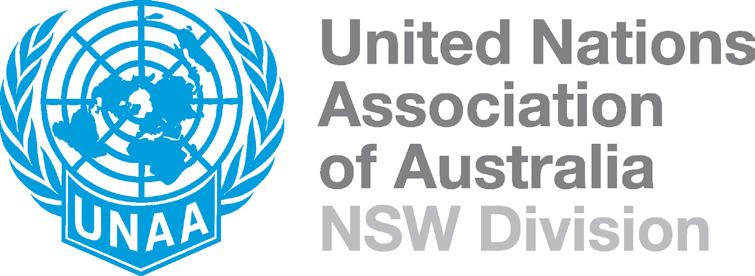
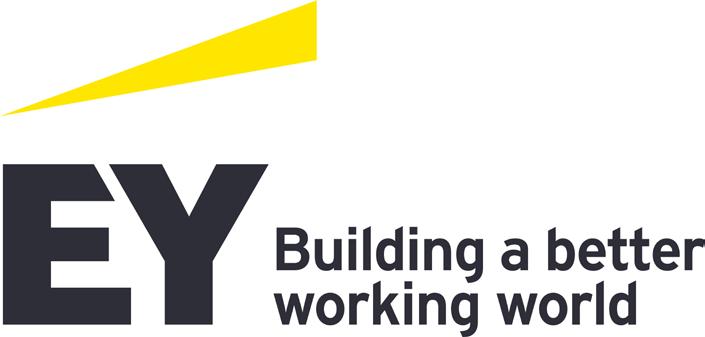

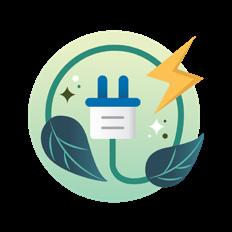
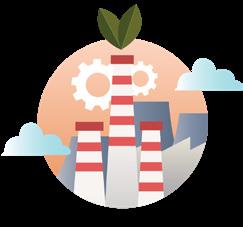
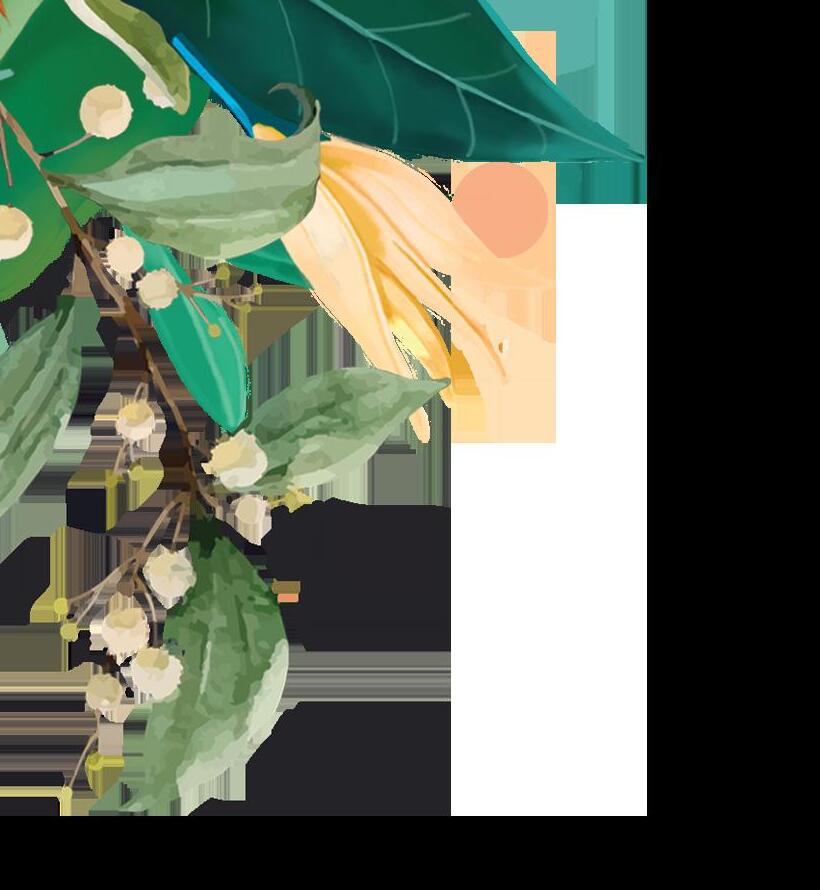






The NSW Government is proud to once again partner with the Banksia Foundation to celebrate the genius, passion and deep commitment that drives our state’s sustainability leaders. The winners of the 2022 NSW Sustainability Awards are leading us to a thriving and prosperous future for our state and community. I am proud and grateful for the talent on display.

The NSW Government shares their vision and is taking bold and decisive action to achieve the sustainable future we all wish for.
We have the ingredients to make NSW a renewable energy superpower - abundant renewable energy resources, a highly skilled workforce and a proven record for innovation. We’re on track to achieve a 50 percent cut in emissions against the 2005 baseline by 2030.
Guided by our Net Zero Plan Stage One, the Net Zero Industry and Innovation Program is committing over $1 billion to clean technology and industrial decarbonisation.
We’re progressing five Renewable Energy Zones to provide cheap, clean and reliable power. We have begun the process to build the 700 megawatt Waratah Super Battery, which will be the largest standby network battery in the southern hemisphere.
Our Hydrogen Strategy will help unlock $80 billion in investment, drive decarbonisation and unlock mammoth export opportunities.
NSW has the most ambitious and comprehensive electric vehicle strategy in Australia, and we’ve already agreed to $3.8 million of incentives to support over 700 electric vehicles and 800 smart chargers.

Our farmers and land managers are embracing the opportunities that come from a cleaner future.
We’re supporting them with $125 million to reduce their emissions, improve carbon management and enhance biodiversity outcomes.
NSW is accelerating the transition to a circular economy, with $365 million committed to our Waste and Sustainable Materials Strategy.
We want a clean, prosperous future for NSW. But it is ultimately a shared endeavour that also depends on the next generation of leaders and innovators. That’s why I was particularly proud to present the Minister’s Young Climate Champion for 2022. This award recognises young innovators who are taking climate action at home, in the community or at school.
All the nominees for this award have shown dedication to creating a more sustainable planet. You give us hope that the ongoing work to combat climate change is in safe hands.
Through the enterprise and endeavour of our people, NSW has the capacity to combat climate change in a way that unlocks opportunity and prosperity for our State.
All the winners outlined in this publication showcase our collective success in creating a more sustainable and resilient State. I encourage you to read and be inspired.

What started as an effort to reduce our waste developed into a whole school environmental action plan.
Our school was drowning in rubbish!
Upon investigation, we sadly identified that our school was contributing 23 x 240 litre bins a week to landfill.
To address this crisis, we created an action plan for change. What started as an effort to reduce our waste developed into a whole school environmental action plan.

We purchased new bins and implemented a radical new sorting system which separates our playground waste into recycling, cans and bottles, and landfill.
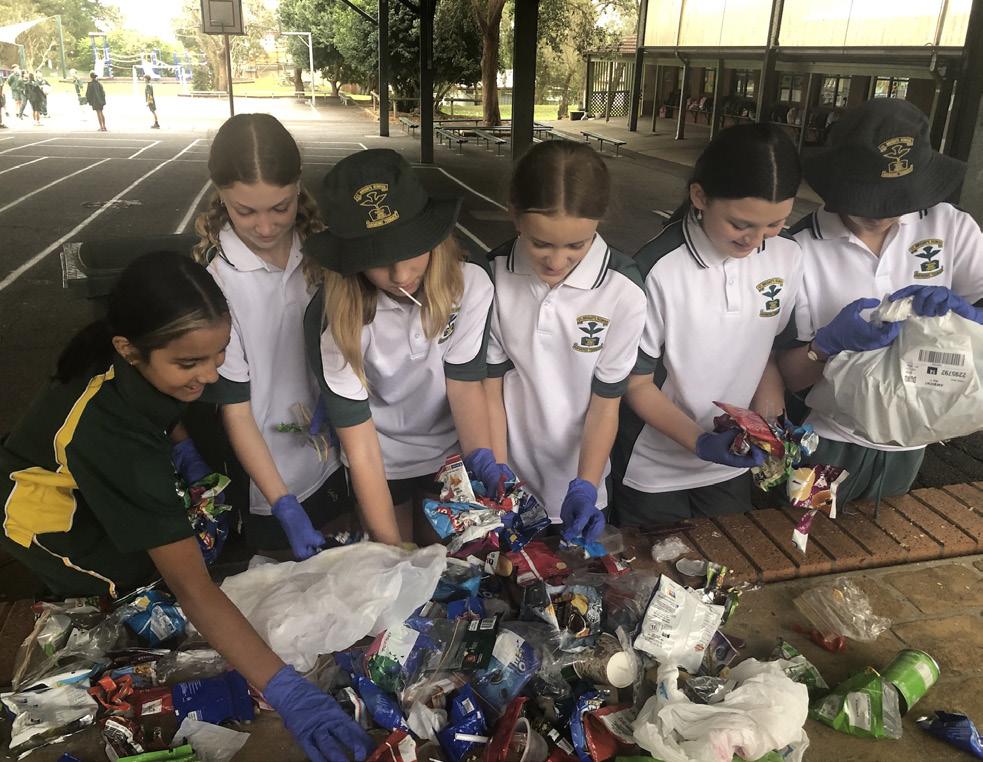
In the classroom we are sorting our glue sticks and pens for recycling, and we initiated plans to overhaul our canteen waste. In the gardens, we are building a habitat for butterflies and bees and composting our scraps. Initially, this was driven by our Year 6 students, however this has now changed and we now have the whole school involved.
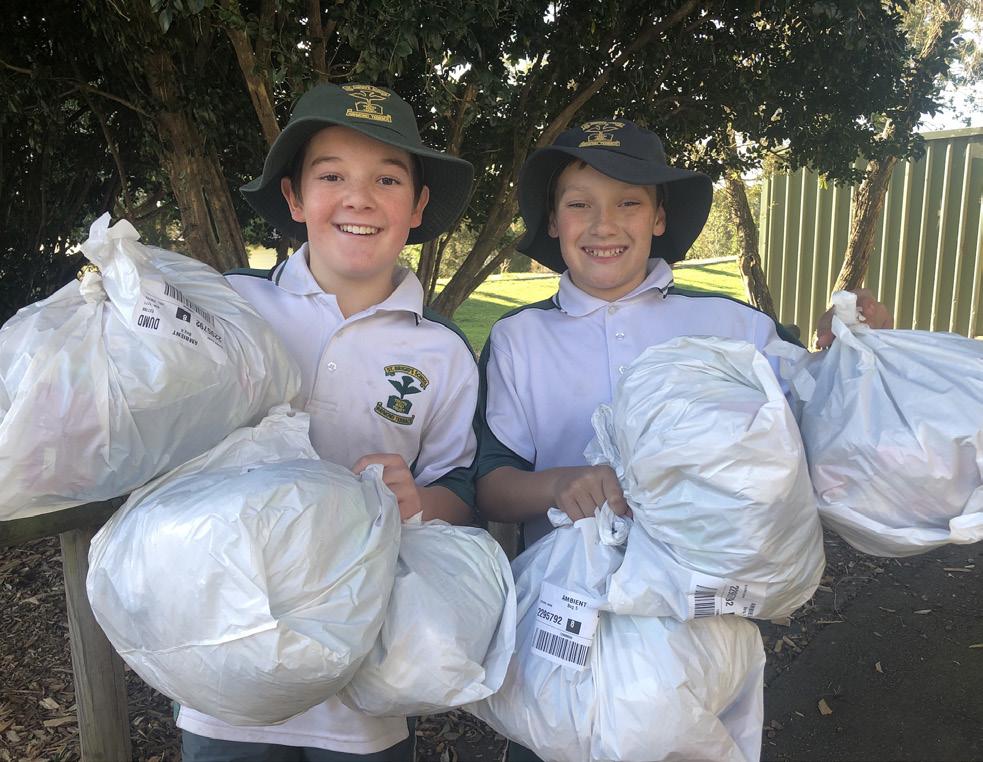
Not only have we halved our landfill contribution, but we have also changed behaviours!

Belltrees Public School is a lighthouse public school, striving to be the greenest, little school in Australia.
Belltrees Public School is a lighthouse public school, striving to be the greenest, little school in Australia.
We reflect on our 143 years of agricultural history, to address the learning needs of our students to enable our youth to flourish in the future.

Our learning community allows our students to develop creative innovative solutions to real world problems.
Our Charter of Sustainability, developed by the Youth Environment Council students, states:
Aim: To become the greenest little school in Australia.

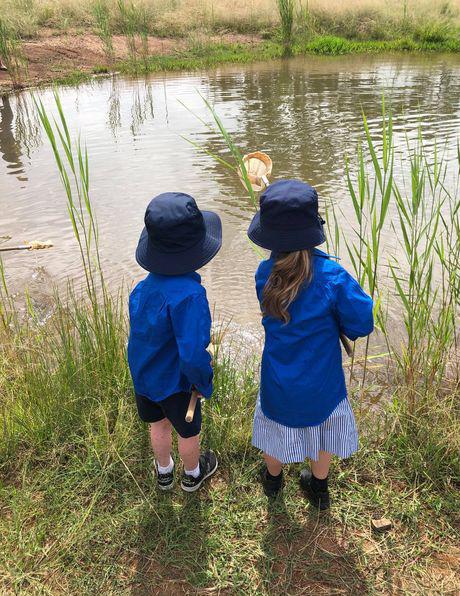

Vision Statement: To create a green sustainable tree covered climate friendly lighthouse school.
Mission Statement: By planting trees, creating leaky weirs, sorting resources, reducing energy use, and learning how living things flourish.
Catchcry: Regen Renegades rule because we are the greenest little school.
“Our most ambitious aim, however, is to move beyond sustainability and into regeneration. Implementing activities that enhance the environment demonstrates how we can give back to nature.”

Five young St Columba Year 6 Sustainability team environmental warriors took it upon themselves to take action by proposing to increase the koala habitat in our school grounds.
Climate change is widely acknowledged as one of the greatest threats to the environment of planet Earth, including fauna and flora, and in our region especially, the iconic koala.
Five young St Columba Year 6 Sustainability team environmental warriors (Tylah Smith, Ellie Hayes, Victoria Hazell, Emma Dixon, Jolie Massoud) took it upon themselves to take action by proposing to increase the koala habitat in our school grounds.

In recent years, much has been lost through drought, Black Summer Bushfires of 2019-2020, and habitat destruction on a neighbouring property in the Lake Innes Nature Reserve region of Port Macquarie. The recent listing of koalas as endangered has propelled them to take action now, to make a difference in the hope of helping and securing the survival of the species.
Their initiative was to replace lost habitat through the planting of trees on the school grounds. For them this was just the beginning, as now they are working on other ideas.



MCi Carbon (MCi) is a world-leading Australian clean technology company that transforms carbon dioxide into building materials and other valuable industrial products for the circular economy.


MCi Carbon (MCi) is a world-leading Australian clean technology company that transforms carbon dioxide into building materials and other valuable industrial products. They recently won Clean Energy Start-up Pitch Battle at COP26 in Glasgow. MCi has an industrial headquarters in Newcastle and a global reference Pilot Plant, at the Newcastle Institute for Energy and Resources (NIER).
MCi is a global leader in mineral carbonation, a naturally occurring process which the team has accelerated from thousands of years into a matter of hours.
MCi Carbon’s patented technology is safe, permanent and profitable, and has the potential to lock away billions of tonnes of CO2 emissions every year. The technology leads a new cleantech field called CO2 Utilization or Carbon Capture and Use (CCU) which treats CO2 as a resource and not a waste.
MCi has received global recognition for its R&D, including the 2018 Resource Innovator of the Year award at the New Materials Summit in Berlin, being featured at which is he World Economic Forum Annual Meeting 2020 and the WEF Pioneers of Change Summit 2021.
Used in many construction, consumer and manufactured products, these carbonates reduce the carbon footprints in products, supporting the circular economy. This double carbon reduction delivers a negative carbon lifecycle benefit and produces high quality, verifiable and permanent carbon offsets.
demonstrating the potential to create value from CO2. MCi uses the Earth's natural process of storing CO2 called mineral carbonation, or weathering. This process of absorbing CO2 into minerals usually occurs over millions of years geologically but MCi have sped up that process to a matter of hours in an industrial setting.
MCi’s global reference Pilot Plant validates a growing pipeline of global commercial scale opportunities. Following 15 years of intense R&D with substantial Australian Government and industry investment, MCi is scaling its technology and working with customers and partners to identify the best industrial locations to build its first Industrialscale Carbon Plants to capture CO2 emissions and convert them profitably into solid materials called carbonates.
MCi Carbon’s semicontinuous research Pilot Plant facility is one of the first-of-its-kind in the world and conducts intensive industrial programs to refine the patented mineral carbonation process, deliver customer projects, and generate low-carbon materials for product testing.

The CO2 used in the MCi process does not need to be high purity- in fact MCi can carbonate direct flue gases. MCi takes CO2 from industrial sources and can also partner with Direct Air Capture technologies.
MCi combines the CO2 with a feedstock, usually an industrial waste like steel slag, mine tailings or quarried minerals. MCi produces magnesium carbonate, calcium carbonate and silica which can be processed into cements, concretes, plasterboards, papers, glass and many more applications.
The Pilot Plant reacts industrial emissions with feedstocks, such as low-grade minerals, to create both carbonates and silica by-products for use in building materials, such as concretes and plasterboards,
The team at MCi are engaged in partnerships with global products companies, developing new low carbon product formulations.

Veolia delivers carbon-neutral water decontamination solutions for remote sites.

Since 2020 Veolia has been implementing sustainable solutions for a major NSW client, with the development of a tailored onsite mobile water treatment plant. The plant allows local treatment of impacted waste waters that is suitable for beneficial reuse.
Australia counts numerous remote sites with contaminated water containing either low hydrocarbons, heavy metals, suspended solids or PFAS (a persistent, bioaccumulative contaminant mainly found on fire fighting exercise grounds). The water can be located in remote areas, adding to the site remediation challenges.
Until recently in Australia, the default management process for highly contaminated water was offsite transport to specialised treatment facilities, often located in distant capital cities.
The main environmental benefits are:
• Replacement of diesel generators by solar panels which decreases the carbon footprint of the process;
• No transport of contaminated water over long distances, further reducing carbon footprint and increasing road safety;
• Return of treated water for beneficial reuse;
• Adaptable setup that can treat a wide range of contaminants;
• Deployment in remote areas;
• Independence to connection to traditional power supplies or utilities;
• A ‘full-packaged’ solution contained between easily movable containers; and
• Designed as a bundled standalone plant, containment of potential spills.
The project has important benefits for the environment and the community:
• The first carbon-neutral plant of this type in Australia;
• 17t CO2 eq avoided per year, per plant for continuous treatment (non automated, 8h/day);
• 6t CO2 eq avoided per year per plant for batch treatment;
• 2.3ML of water treated and returned to local environment during the 1st campaign;
• The first treatment campaign saved the client $500k (40%) compared to offsite disposal;
• Increased skill sets and employment opportunities for operators in remote locations;
• 100% locally sourced labour (NSW) for design (local engineering firm) and build (locally manufactured panels); and
• Project led by women in a technical field.
The Veolia solarpowered plant is the Australian solution developed for a global contamination issue. We can expand in any Australian region as we have a local presence in all states.
The plant was built in Australia following the design of our engineering team, with the support of our trusted local partners. It is the result of intense collaboration between the Veolia waste, water and energy branches.

There is an increasing need in Australia for sustainable, carbon-neutral, off-grid water decontamination solutions that can reduce a company’s environmental footprint, and our scalable and easily reproducible concept fulfils this need. The plant requires low CAPEX and limited operational expenditures once in use. The design is flexible, and future plants are built from lessonslearnt from current operations.
Our ambition with this initiative is twofold:
- Set a new minimum engineering standard for our company with all new plants designed to be carbon-neutral and solarpowered; and
- Change the industry’s mindset by leading the way with sustainable solutions.
Currently, we have 2 mobile plants in use (one being solar-powered), and we are currently building a third-generation plant that will be fully automated and carbon-neutral through the use of solar panels.
We have developed eco-socially conscious products to clean water from nutrient contaminations and recycle for other applications.
This initiative is a success story of the collaboration between Western Sydney University and Zeolite Australia. A young university ranked first in the world for sustainability and a small mining company leading the industry, by developing products for environmental applications around the globe.
Our aim was to develop a product to address the issue of excess nutrients in water - resulting in issues such as algae bloom - that can also help with the issue of fertilizer shortage.

We embarked on this journey in 2019 and navigated through the challenges of the global pandemic in addition to the inherent uncertainties of research and development.
Through close collaboration and shared core values, we successfully developed unique products that are successfully used to capture nutrients in surface water and industrial waste for reuse and recycling.
The manufacturing method has low water and energy consumption and zero discharge.

After careful laboratory testing, the method has been scaled up successfully and the required workforce is trained.
Further field tests are in progress to identify other applications such as managing mass fish die-offs in waterways and new markets.
We have the insight, expertise, and passion to continue to develop this technology. We realize the immense potential for this technology to be a worldleading environmental solution to multiple problems, for instance, loss of biodiversity caused by the destabilisation of waterway and estuary ecosystems via excess nutrient leaching from agricultural land.
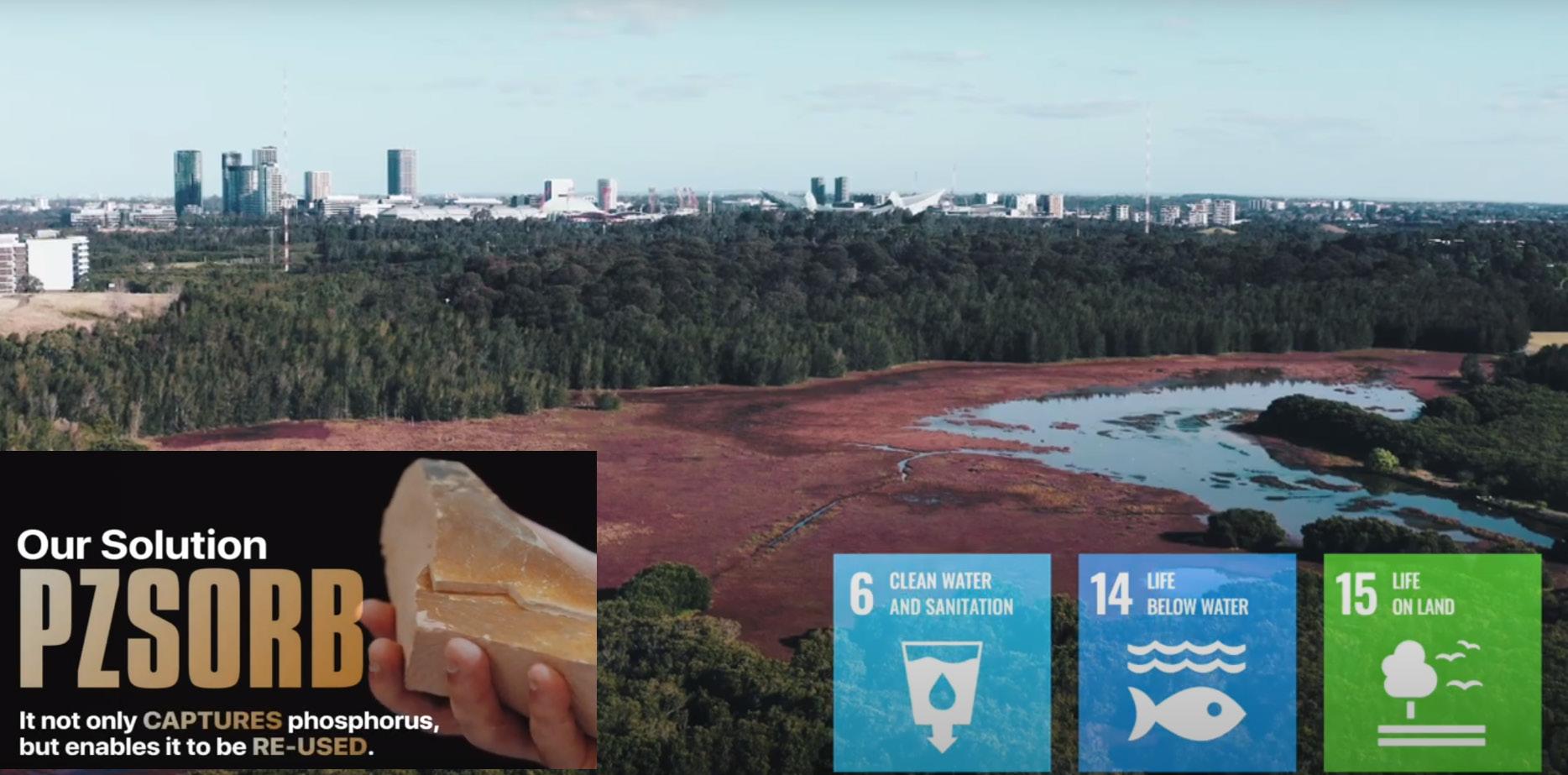
The next step is manufacturing on a large scale in Australia, which will be received by attracting investment from the government and companies with shared values.
This initiative is an example of what can be achieved through collaboration between Industry and academia and will encourage Australian industries to be innovative and think globally. Great market potential and healthy revenue can be achieved by developing products that help to improve the environment.

Sustainable Farms has created a powerful tool, BirdCast, that helps farmers identify management actions that could support threatened birds on their properties.
The Sustainable Farms team has created a powerful tool that helps farmers identify management actions that could support threatened birds on their properties.

BirdCast, a free web tool developed by our team at The Australian National University, allows farmers to predict the birds living in woodlands on their farms.

Director of Sustainable Farms at ANU, Michelle Young, said BirdCast helped farmers protect Australia’s incredible wildlife and biodiversity.

“BirdCast is a practical tool that supports farmers and land managers to protect and conserve our shared natural heritage,” she said.
“At a time when many species of plants and animals are threatened by extinction, woodland areas on farms are extremely valuable, providing food and homes for many of these species,” Ms Young said.
“Temperate woodlands in south-east Australia cover some 506,000 square kilometres. That’s the size of Spain – and most of this area is managed by farmers.
“It’s important that management of these areas is supported by science to help protect biodiversity and our precious wildlife living in ecosystems that are under threat.”
The BirdCast web tool is based on decades of research on 62 different bird species, providing farmers and land managers with a wealth of information at the click of a button.
Sustainable Farms Lead Scientist Professor David Lindenmayer said making the data captured by BirdCast easily accessible to farmers was already creating better outcomes.
“Biodiversity in the woodlands of southeastern Australia is under threat, and farmers are keen to know how they can help turn this around,” Professor Lindenmayer said.
“The long-term ecological studies undertaken by our team over two decades mean we have a really good understanding of how wildlife responds to management changes.”
“The BirdCast tool gives land managers a solid indication of how their own changes in management might have a real-world impact on biodiversity,” Professor Lindenmayer said.
“It enables land managers to access real science to help them make the best decisions for their farm.”
“Getting this information into the hands of farmers and land managers means they are better equipped to help protect our wildlife and ecosystems.
“BirdCast supports decisions when it comes to managing woodland areas on farms that are better for our birds, better for our land and better for our environment.”
Regarding BirdCast’s impact, Ms Young said “Here at ANU our mission is to develop and deliver solutions that improve Australia and our world. We think BirdCast is a great example of that mission."
“We are proud of the improvements BirdCast is already delivering and the response it has received.”

It enables farmers to predict what birds might use and live in woodland areas on their farm, and to understand how the bird species present might change under a range of scenarios, such as planting a new shelterbelt or restoring a degraded patch of remnant woodland.
Aussie Ark creates wildlife sanctuaries free from the overwhelming threats of feral predators including the cat and fox.
Aussie Ark is committed to creating a long-term future for Australia’s threatened wildlife and their ecosystems. Through the creation of insurance populations, Aussie Ark is breeding endangered wildlife fit for return to the wild.

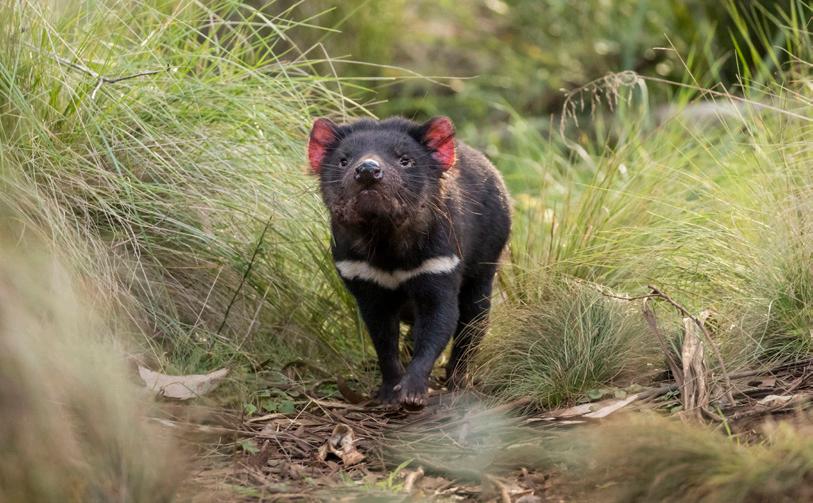
Aussie Ark is returning the East coast of Australia back to its pre-European settlement glory, by effectively managing threats such as introduced feral predators, noxious weeds, fire and rewilding Australia’s most endangered species.
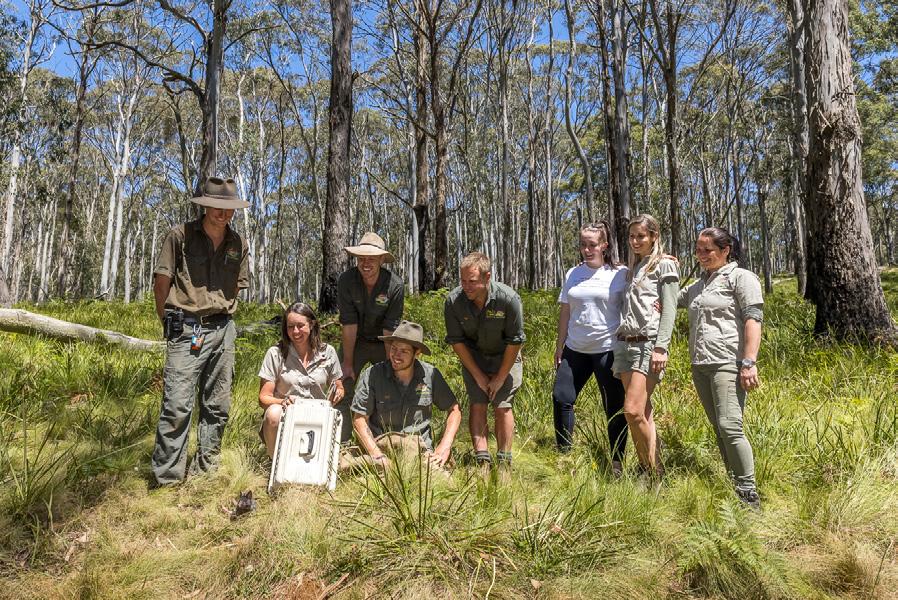
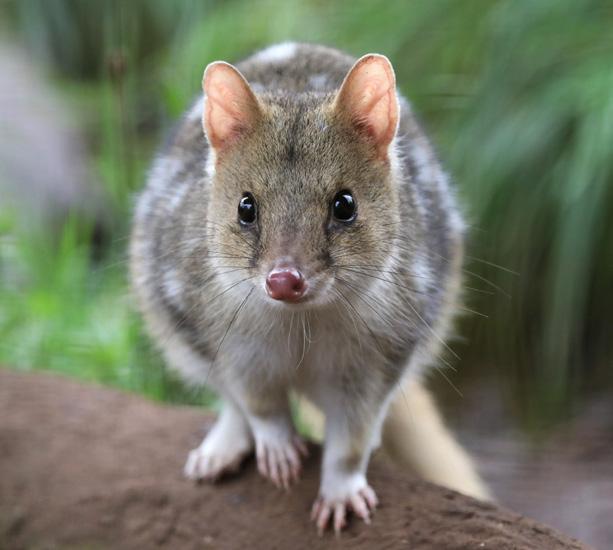
Aussie Ark's Barrington Wildlife Sanctuary has been a labour of love of many years. That culminated with the official first release of wildlife in early 2020 and an official opening event in November 2020 (post covid).
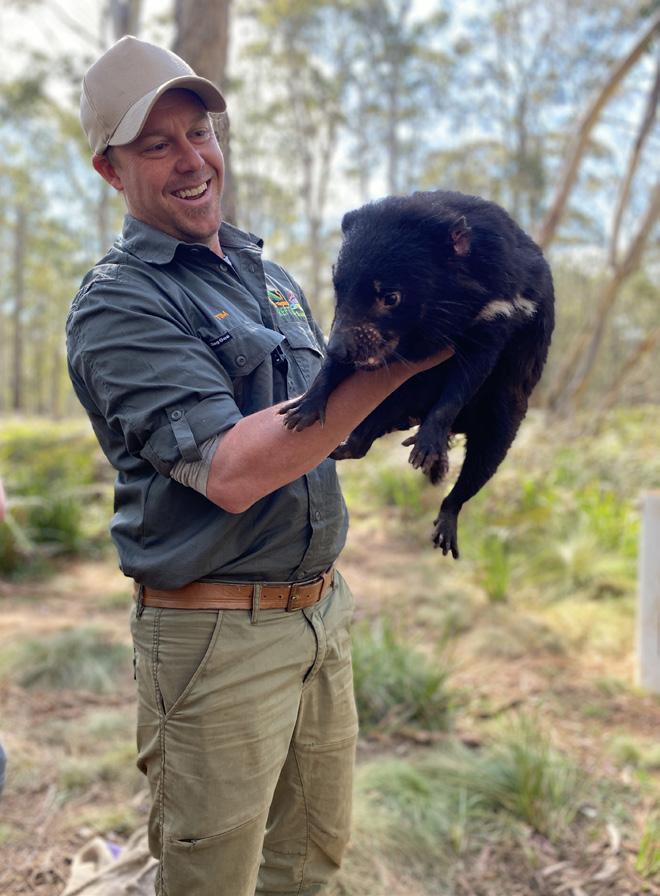
The Barrington Wildlife Sanctuary has now become a wildlife hub, that has seen the return of Tasmanian devils to a wild landscape on mainland Australia for the first time in 3,000 years and the return of Eastern Quolls to the Barrington Tops for the first time in more than 50 years.
The organisation's value lies in their unique ability to develop wildlife refuges, and combine their endangered wildlife 'insurance population' development to stock and augment the habitat as it would have been some 200 years ago.
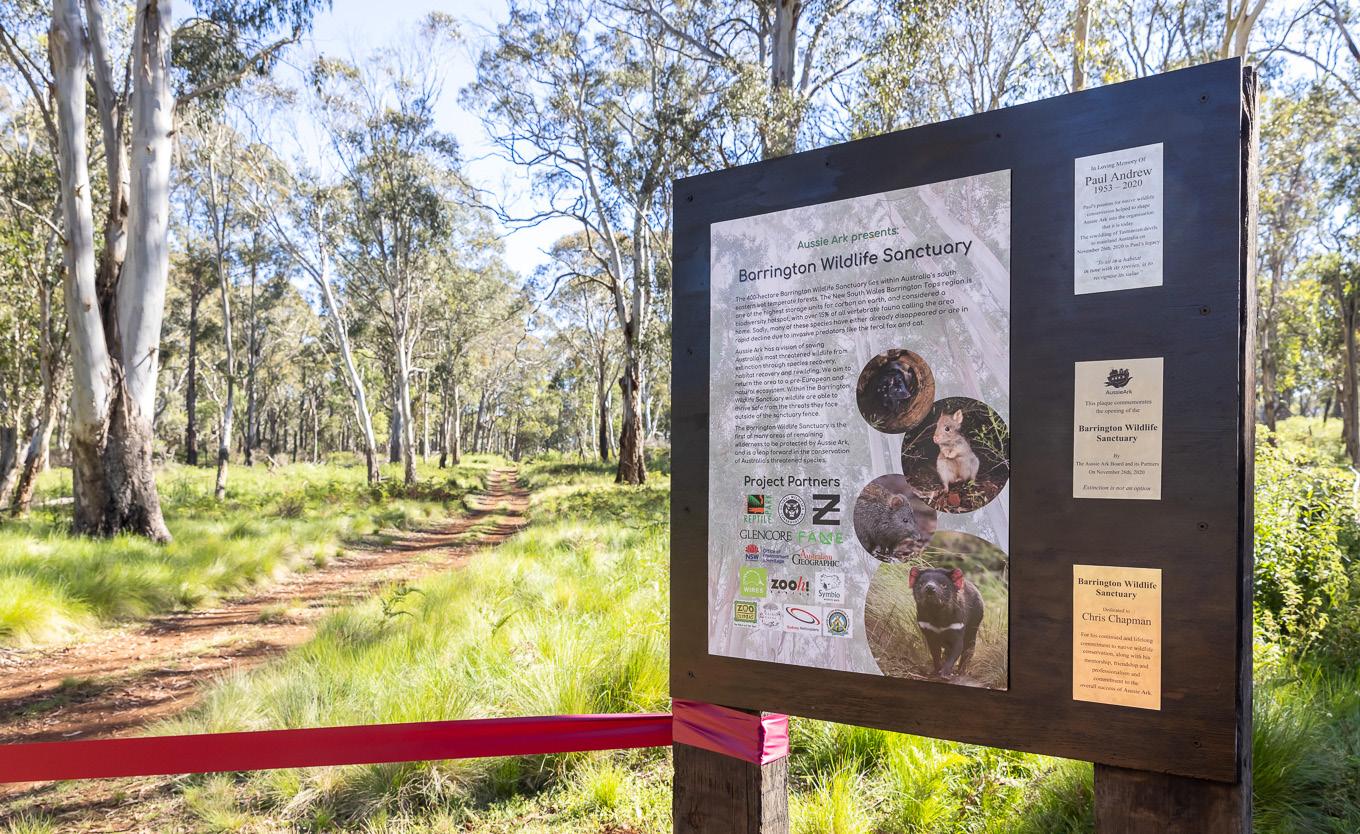
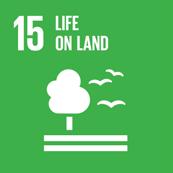
Threatened species boom in feral predator-free areas.
The most ambitious rewilding project in Australia is showing exciting progress, with 10 reintroduced locally extinct species thriving, and resident threatened species booming after the eradication of foxes and cats.
Along with partners, the University of NSW’s Wild Deserts (UNSW) and Australian Wildlife Conservancy, the NSW National Parks and Wildlife Service (NPWS) set out with a bold plan to create large areas within which feral predators could be eradicated and locally extinct mammal species like the bilby and numbat be reintroduced. Some of these species have been extinct in the wild in NSW for more than a century.

All ten species reintroduced to date are thriving.
At Mallee Cliffs National Park, the bilby population, which started at 50 animals, has grown to over 170.
At Pilliga State Conservation Area, the reintroduced population of bridled nailtail wallabys has increased by 350%.
At Sturt National Park, the crest-tailed mulgara population has grown from 19 founders to over 200.
Many resident threatened plant and animal species are also reaping the benefits and bouncing back.
At Mallee Cliffs National Park, almost all the active malleefowl mounds in the national park are located inside the feral predator-free area.
UNSW ecologists have recorded the Eyrean grasswren in NSW for the first time since 1961 at an incredible 20 sites in Sturt.
AWC ecologists recently recorded a species of planigale, a small marsupial mammal, inside the feral predatorfree area at Mallee Cliffs National Park; the first record for this location.
AWC ecologists recently trapped high numbers of the threatened Pilliga mouse, with more located inside the Pilliga feral predator-free area than out.
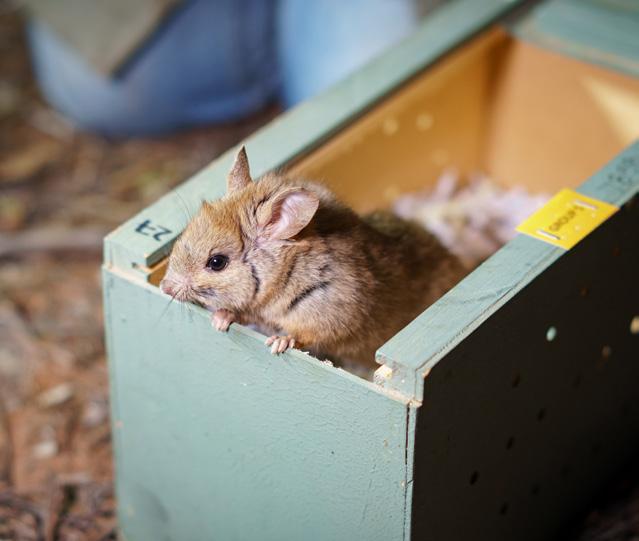

Other native species have also increased, showcasing the boost to ecosystem health from removing feral predators:
At the Pilliga State Conservation Area site, yellow-footed antechinus abundance has more than doubled inside the feral predator-free area since the previous survey 12 months ago, and is more than ten times higher than outside.
At Mallee Cliffs National Park, small mammals including the common dunnart are more abundant inside the feral predator-free area compared to outside.
At Sturt National Park, recent surveys recorded nearly double the number of small mammals inside the feral predator-free areas compared to outside, including Forrest’s mouse, the threatened dusky hopping mouse, and plains mouse, which until recently was considered extinct.
These results are heartening as we triple the size of the current network of feral predator-free areas on the national park estate, where we expect to provide a measurable conservation benefit for at least 50 threatened species.
Within a few years, this project could remove at least 10 mammals from the NSW extinct list – a key step in the restoration of biodiversity.
Effective partnerships between Government and conservation organisations are helping deliver the resources and expertise required to provide conservation at scale and restore Australia’s unique biodiversity.
WIRES Emergency Rescue Team provide professional services for critical wildlife rescues.
WIRES is Australia’s largest wildlife rescue organisation. WIRES has been rescuing and caring for sick, injured and orphaned native animals for over 35 years, and their mission is to actively rehabilitate and preserve Australian wildlife and inspire others to do the same.

The 2019/2020 Black Summer Bushfires played a significant role in the decline of native wildlife and their habitat. During this catastrophic event, WIRES was on the ground providing emergency wildlife rescue assistance every day.
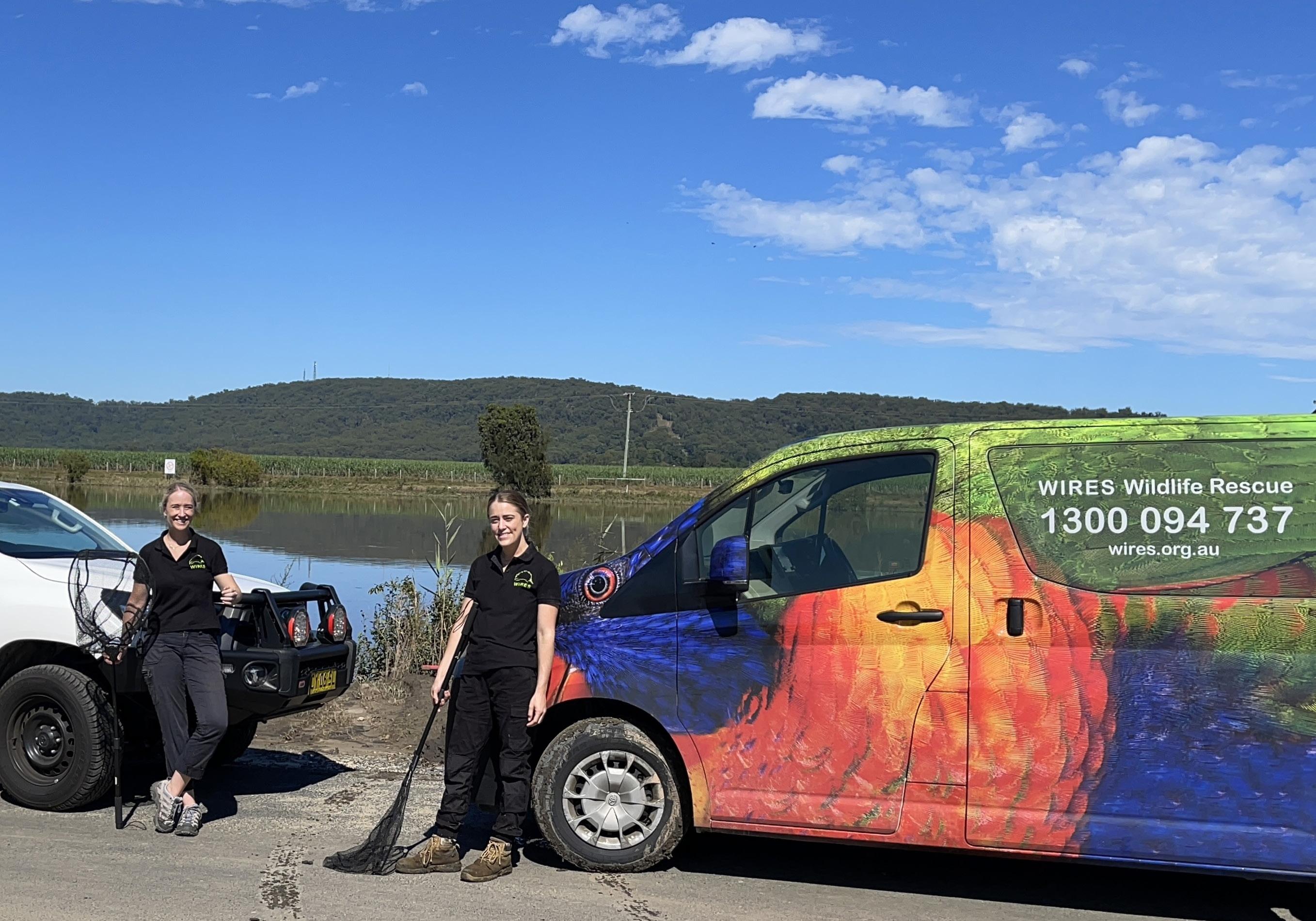
It became clear during this time that a well-resourced Emergency Response Team (ERT) that could be dispatched at a moment’s notice was increasingly needed, as the effects of climate change are compounding existing threats and radically impacting native wildlife.
Across three states, WIRES now has a team of highly trained individuals whose full-time role is emergency wildlife rescue and response. They assist with priority urgent rescues for individual animals in distress every week and are deployed to provide additional support to areas being impacted by major emergency events, such as floods and bushfires.
These emergency responders have extensive handling experience across all species, including venomous snakes, threatened species such as koalas and grey-headed flying-foxes. Actively rescuing, rehabilitating, and preserving native wildlife encompasses WIRES’ mission, and the ERT’s objective is to improve wildlife welfare through quick and effective emergency response, increasing the chances of successful rescue, rehabilitation and release.
In February 2022, the ERT was deployed to flood-affected Lismore NSW in two wildlife ambulances stocked with necessary equipment and supplies. The team delivered supplies and food for wildlife to volunteers, while assisting with 30+ critical rescues and transportation of 40+ native animals to carers or vets. They supported tired volunteers and wildlife carers who, in some cases, had lost most of their own belongings in the floods, yet were still taking in wildlife in need of care.
In addition to helping wildlife, volunteers felt emotionally supported thanks to the care and assistance the ERT were able to give during that devastating time.
The ERT made contact and met with other organisations assisting with, or impacted by, emergencies, such as Friends of the Koala and the RSPCA. These collaborations were crucial to the rescue and rehabilitation of wildlife affected by the floods in the Lismore area.
Since the bushfires and subsequent flooding, the ERT have assisted in 7,384 critical recues, with 439 of those being koala related.
The development of WIRES ERT accelerated WIRES’ ability to respond to more wildlife rescues quickly and professionally and increased their capability to deploy highly trained personnel and well-equipped wildlife ambulances to major disasters when they occur. Although WIRES remains reliant on the assistance of outstanding community members and volunteers to assist with rescue response, ongoing access to our growing ERT provides a vital resource to fast-track emergency response to the most urgent and challenging rescues.
To the best of our knowledge, WIRES ERT are the only professional wildlife emergency response team in Australia operating in the field full-time, providing urgent emergency rescue services for wildlife.

CurbyIt, the future of recycling.
Historically one of the most problematic materials to recover, soft plastics have become the centre of debate when discussing the transition towards sustainability. The food preservation properties of this light and fluffy material, that ultimately save waste and carbon, are not always possible to replace. Producers are seeking a sustainable way to continue using it whilst addressing environmental consequences and consumer concern.
Operated by CurbCycle, CurbyIt is an easy and convenient soft plastics recycling program that enables households to recycle soft plastics through their kerbside recycling bin, tapping into the existing infrastructure and collection service offered by Council.
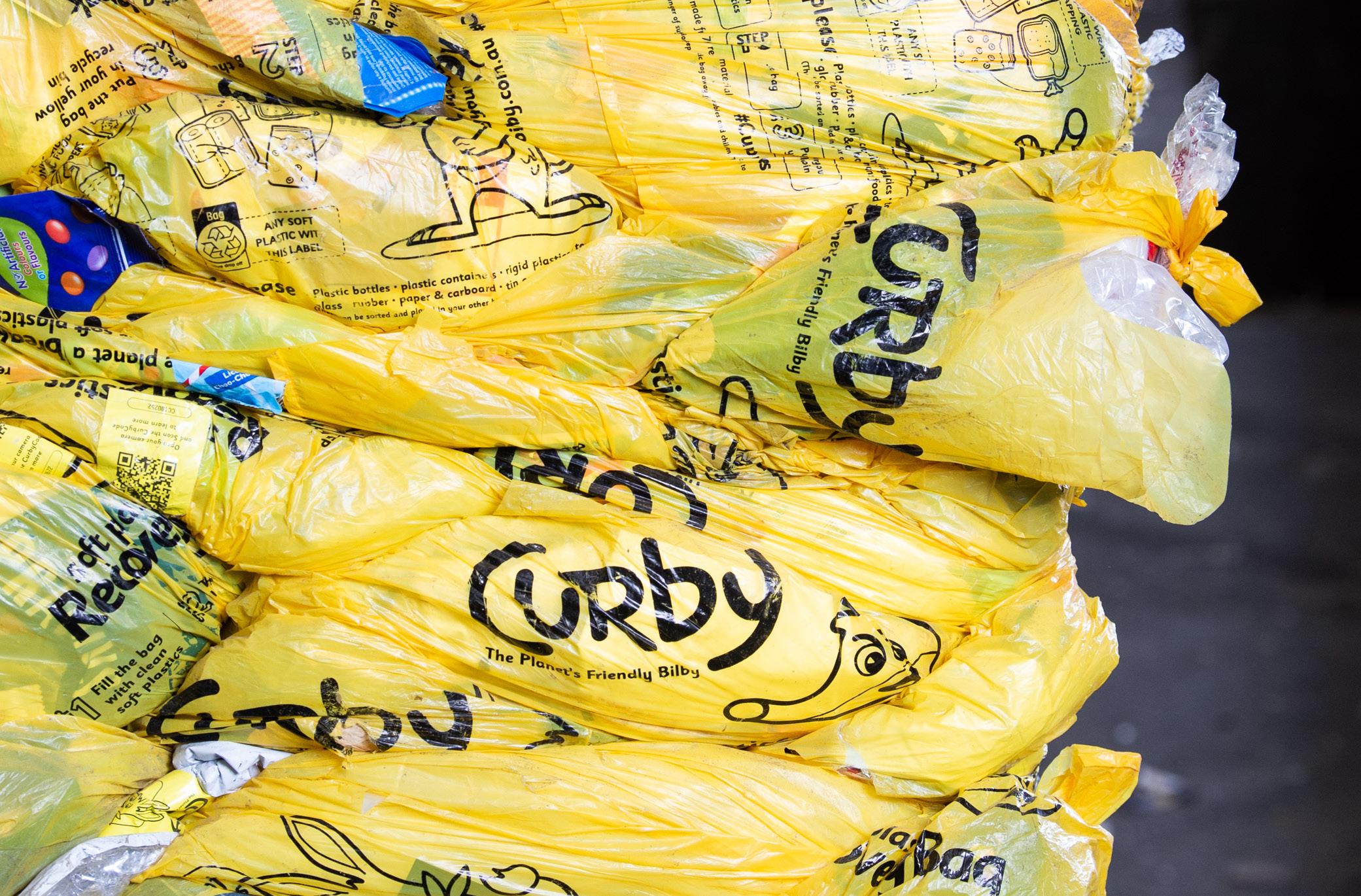
Connecting community and industry through an innovative extended product stewardship program, Curby enables households to recycle soft plastics by segregating them into a used plastic bag and attaching a CurbyTag with a QR code to be scanned before placing the bag into their kerbside recycling bin. The bag and its contents go on to be recycled together!
The CurbyTag enables efficient identification and sorting of the bag at the recycling facility and households receive acknowledgement from Curby enabling rewards in the future. The geolocation, quality and quantity of the soft plastics is reported to Councils, recyclers, and industry partners through an interactive dashboard.

Through effective engagement with participants, the Curby Program guides and nurtures sustainable behaviour within the community to recover high volumes of soft plastics, with low contamination rates resulting in a desirable product for re-manufacturers; transforming what was once considered waste, into a valuable circular resource.
Since Curby’s first trial with Central Coast Council 18 months ago, the Curby Program has commenced full scale operations and now operates in 5 NSW Councils with over 30 Councils expressing interest to adopt a Curby Program.
With over 20,000 households successfully recycling soft plastics and other hard to recycle materials through their kerbside recycling bin, CurbyIt have diverted more than 180,000 bags of soft plastics from landfill, preventing them from becoming wind-blown litter in streets or pollutants in waterways.

At current growth rates, CurbCycle forecast the Curby Programs could efficiently achieve 20-30% recovery rates within the next 3 years without costly incentives like Container Deposit Schemes (CDS) or the need for new collection infrastructure.
The Curby Program builds on the foundation of existing behaviour and infrastructure, resulting in an easy yet cost effective adoption and a successful blueprint to recover other problematic material. Driven by industry collaboration and supported by local government, processors, and producers, CurbyIt helped build a value chain for soft plastics by delivering a responsible consumption and production service innovation to the community.
Following the success of the Soft Plastics Program, the duplicatable blueprint CurbyIt has created now maps to expand into more Councils and start recovering other “hard to recycle” materials such as textiles and batteries.
With activation and empowerment of community through education and measurable impact, CurbyIt has bridged the gap between community and industry to achieve a sustainable future together as responsible consumers and producers.
Changing the way to take away, Green Caffeen is a reusable swap and go coffee cup system.
Green Caffeen is a reusable swap and go coffee cup system, providing participating cafes with reusable cups as an alternative to disposable single-use cups.

For coffee drinkers, it’s like borrowing a library book - free as long as they bring the cups back.
All they need to do is download the free Green Caffeen app and sign up with a few details. Immediately, they’ve got access to a network of reusable cups and can find cafes all over Australia using the inbuilt cafe finder. Since its inception in 2018, there are more than 700 cafes now offering the Green Caffeen system.

At the cafe, they order their coffee in a Green Caffeen cup and using the app, select either ‘grab swap or drop’ and scan the Green Caffeen code, which checks the cup out of the cafe and into their account.
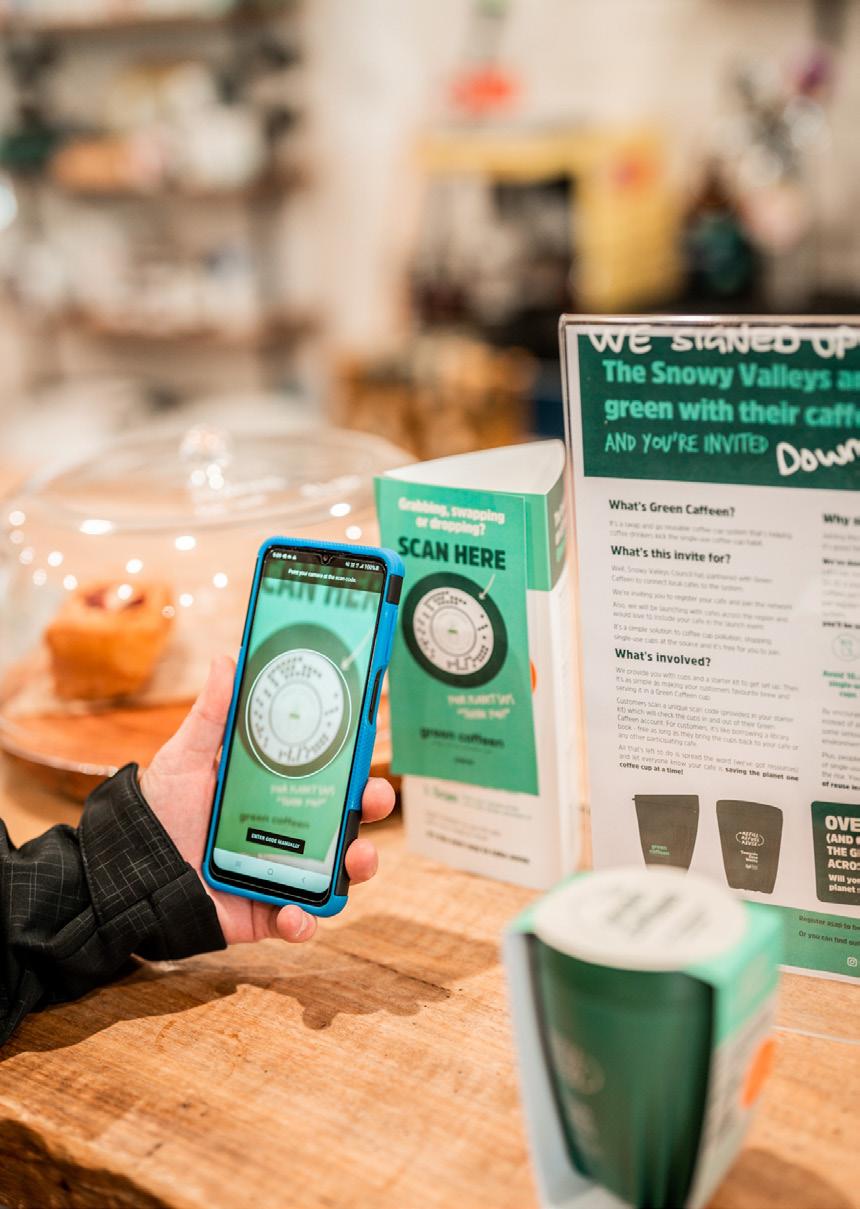
Next time, they simply return their cup (or cups) to any participating cafe, scan the code again and swap the cup for a fresh one. The real beauty about Green Caffeen is it takes the hard work away. If they’re out without a reusable cup, Green Caffeen cups are waiting at the cafe for them. Plus, they’re allowed to have two cups checked out at once. If they can’t return the cup within 30 days, they’ll incur a late cup fee of $12.99. This motivates customers to keep the cups in the system so they are always circulating.
Reminder emails are sent out at 14 days and 28 days. The app also has an option to return a previously charged overdue cup, which triggers an automatic refund once the cup is scanned back in.
Coffee drinkers don’t need to wash their cups either - they simply drop them back at the cafe. Cafes wash the cups in their dishwasher and now the cup is ready to hold its next coffee!
The aim is to reduce dependency on single-use coffee cups by providing a simple solution to coffee cup pollution that also addresses a common waste behaviour in our takeaway coffee culture.
Green Caffeen is proud to provide a cup that is made in Australia from locally sourced recycled plastic and is a closed loop product that can be recycled into a new cup when it eventually reaches end of life.
Cafes are taking a step towards stopping single use at the source by providing a reusable alternative, and coffee lovers no longer need to remember to bring their cup.
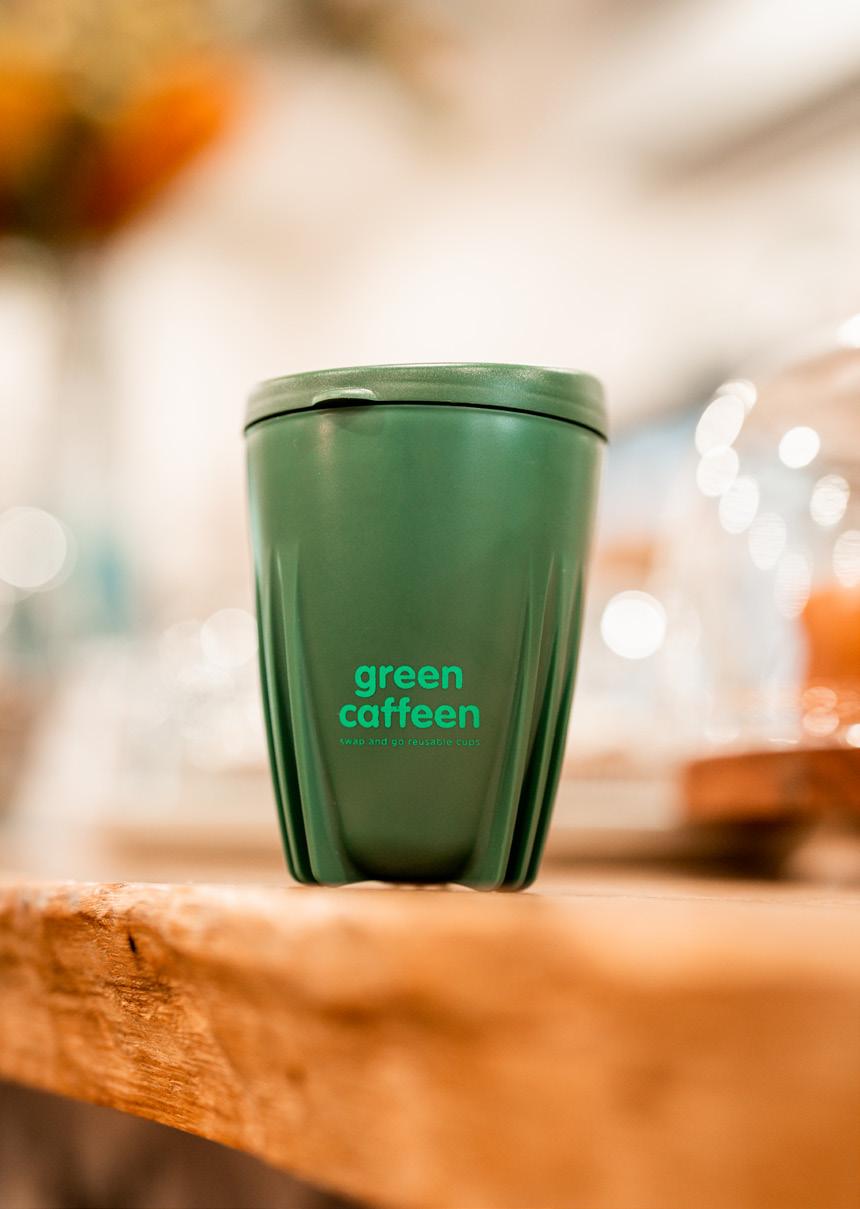
So far 1.5 million single-use coffee cups have been avoided, ultimately diverting them from landfill or from littering our oceans, waterways, streets and parklands.
Diversifying council recycling operations towards a sustainable circular economy.
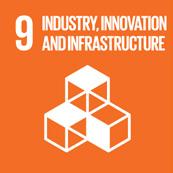
Shoalhaven City Council owns and operates 10 Recycling and Waste Facilities across the 4,567km² Shoalhaven LGA, accepting approximately 138,000 tonnes of combined MSW, C&I and C&D waste streams annually.
Council has already established multiple recycling operations and has commenced several other innovative recycling projects, ensuring fully integrated processes in a diverse recycling operation.
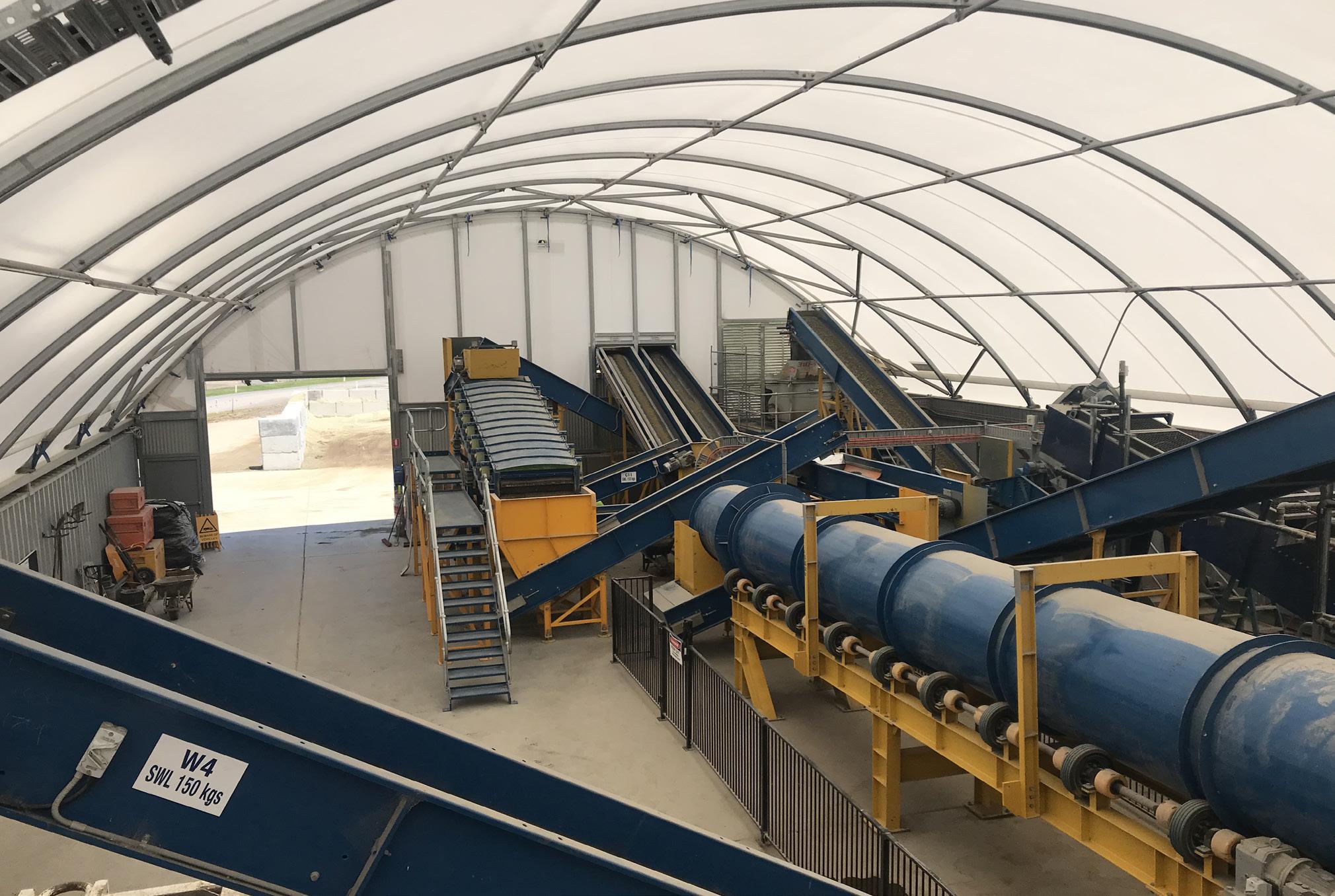
This will be achieved through diversifying our waste management and recycling infrastructure at the West Nowra precinct with 20 current and planned projects. These projects maximise diversion from landfill while optimising an integrated system striving to achieve better environmental outcomes, and send more resources and products to a circular economy.
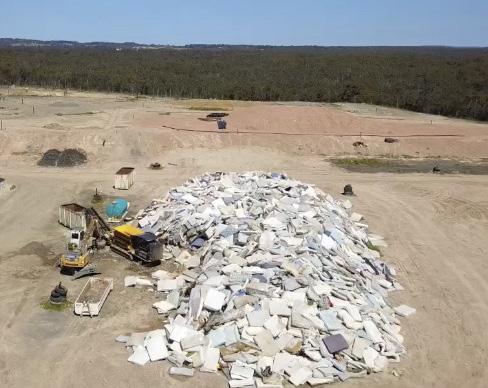
Council ultimately has ownership of all waste materials in kerbside collection bins or dropped off at the facilities. We are therefore in an ideal position to implement strategies and take advantage of opportunities to address each material individually or as a group, and develop techniques for maximising recovery to be more proactive and agile in managing new, emerging, or changing waste streams.
Regional Councils need to think more strategically, innovatively, and outside of the box when it comes to managing the potentially recyclable waste stream at their facilities.The Shoalhaven council has looked at this challenge as an opportunity and identified numerous options to recycle various unique materials in ways that complement each other and provide many opportunities that contribute to a sustainable circular economy.
This translates into five unique objectives, as follows:
1. Divert waste from landfill –Council is targeting the diversion of above 90% of waste by 2024, leaving 10% or less for landfill. The highprofile actions include:
a. Innovative autoclaving and sorting of red lid bin mixed waste through Bioelektra with the target of less than 10% residual left for landfill.
b. An advanced Materials Recovery (MRF) process to recover greater than 95% of materials from the yellow lid recycling bin. Additionally, recovery of various problematic materials such as soft plastics and coffee pods utilising community engagement.

2. Integration of processes –Develop multiple strategic recovery and recycling processes that compliment and harmonise operational elements to send recovered resources to the highest possible order of recycling outcomes and a sustainable circular economy.
3. Quality before quantity –Council has observed that when times are tough, recyclable products with increased contamination are rejected by the end processors, so the only way to be resilient through the fluctuations in the recycling market is to pursue high-quality end products.
4. Identify small volume recovery options – a high focus on quality and separation of small volume materials such as expanded polystyrene, PVC piping, old clothing (textiles), electrical cables and soft plastics. While not making a big impact to diversion, they are high demand and valuable commodities that contribute substantially to the circular economy.
5. Act in collaboration –opportunities are identified by staff, whilst partnerships with various organisations and academic institutions provide the science and engineering to make it work.
The approach targets a greater than 90% diversion from landfill of all waste streams by 2024, well exceeding the NSW Waste and Sustainable Materials Strategy 2041 targets.
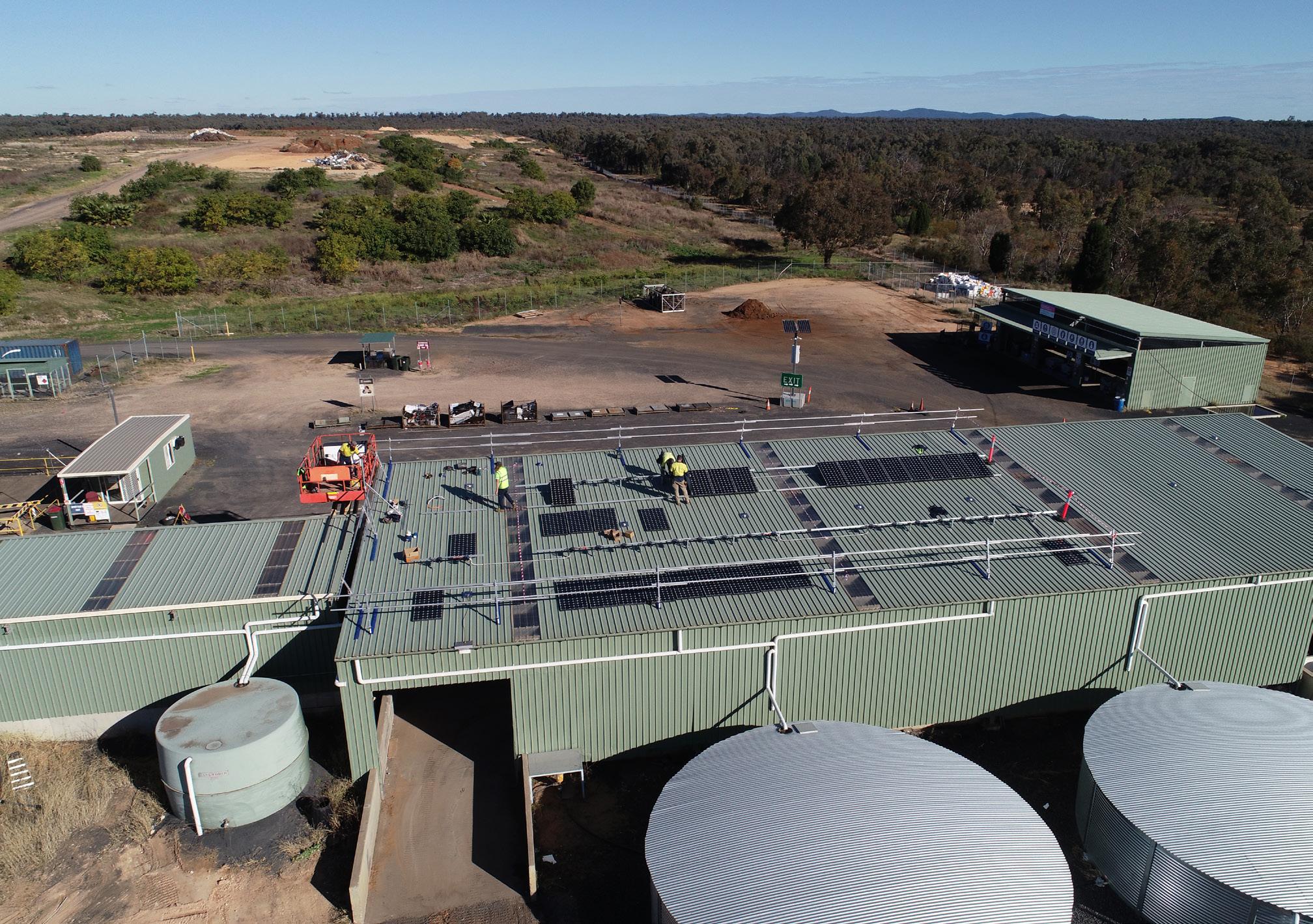

Australia leads the way in rooftop solar installations, but solar panels are emerging as a growing source of waste and many of the solar panels currently being disposed of have many years of service life remaining.
Solar panels are designed to operate for 25-30 years, but as people upgrade to larger solar systems for their homes and businesses they are disposing of solar panels that are less than 10 years old because they don’t know what else to do with them.
Globally, solar panel waste is one of the fastest e-waste streams and could be up to 8 million tonnes by 2030, rising to 78 million tonnes in 2050, with many of these panels still having significant remaining service life.
“Around Australia we are installing record amounts of rooftop solar systems, but at the same time we are also throwing away fully functioning older solar modules into landfill. As we transition to 100% renewables it is like trying to fill up a bucket with a hole in the bottom of it,” said James McGregor from the Blue Tribe Company.
The second life solar project set out to establish a new whole-ofsupply chain business model and secondary marketplace that will divert serviceable decommissioned solar panels from landfill for reuse in community solar gardens.
On June 14th 2022, Dubbo Regional Council (DRC) became the pilot site for a first-of-its-kind second life solar project, installing a small 7kW solar system made up of second hand (serviceable) solar panels that were destined for landfill on the Small Vehicle Receival Centre at Council’s Whylandra Waste and Recycling Centre.
“The project in Dubbo is just the beginning. Second life solar has been designed to be scalable and a service that can be offered by any solar installer in Australia. Our goal is to divert 10,000 tonnes per annum of reusable end-of-life solar panels from landfill by 2030” said James McGregor.

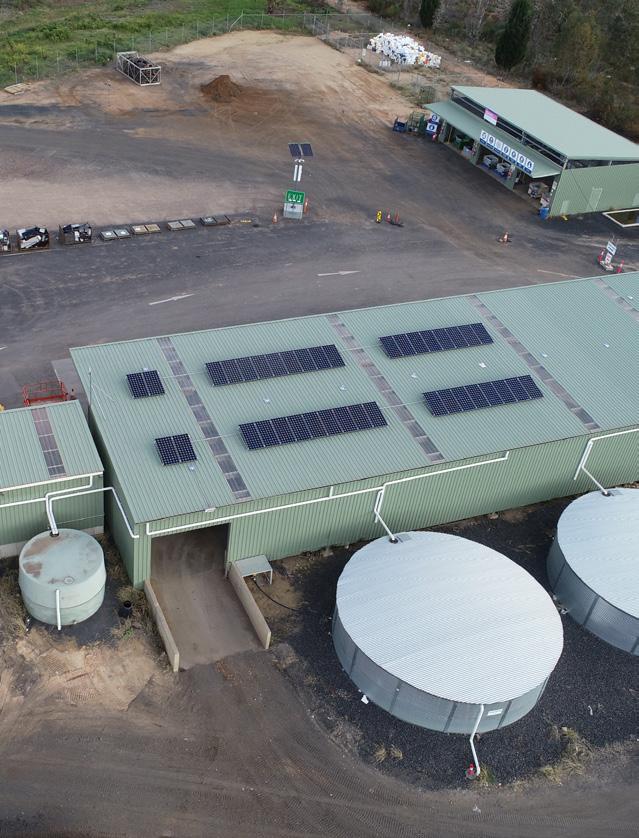
Reduce, reuse and recycle are key tenets of a circular system. Until now, recycling solar panels has been the only option for solar system owners. Sending the growing number of working panels to recycling facilities is a tremendous waste of resources, and increases the burden for panel recycling, which is still in its nascent stages.
The second life solar project has created a pathway for solar panel reuse and added an important element for a truly circular solar industry.
“This project is about giving these panels a second life by diverting them from landfill, utilising them to continue to generate clean energy and to help us transition to a net zero economy sooner.”
UNSW achieved net zero operational emissions with UNSWdeveloped photovoltaic technology, which targets its value chain emissions to support climate action across the wider economy.

UNSW has a long history of groundbreaking teaching and research in fields including climate science, sustainable materials, and solar energy, carried out on its campuses and forming part of the
daily lives of over 62,000 students and 6,700 staff. This activity also makes UNSW a major landowner, consumer, and investor.

In 2018 UNSW’s President and Vice-Chancellor announced the intention for UNSW to switch to 100% renewable electricity and offset all remaining energy-related emissions from 2020.
Through a 15-year solar PPA, UNSW electricity use is now supplied 100% by Sunraysia Solar Farm. This solar farm, covering 1000 hectares, is one of the largest in the world, and at peak output generates over 200 megawatts of electricity; enough to power 50,000 homes. Furthermore, UNSW’s own ingenuity underpins this new source of renewable energy, with approximately 140,000 panels using PERC silicon solar technology. Pioneered at UNSW by Professor Martin Green and the late Professor Stuart Wenham.

In combination with energy efficiency measures, onsite solar projects and a small portion of carbon credits to offset natural gas and residual emissions, UNSW achieved net zero operational (scope 1 & 2) emissions in 2020.

Moreover, under the UNSW Environmental Sustainability Plan (2019-21), UNSW committed to measure and reduce its total (scope 1, 2, and 3) emissions in line with climate science. In 2020, UNSW undertook a comprehensive GHG inventory aligned to the best practice standard for GHG accounting and the Greenhouse Gas Protocol, including emissions across its entire value chain.
The result is the most comprehensive GHG inventory of any university in Australia, which found that indirect or ‘scope’ 3 sources (upstream and downstream value chain emissions including travel, purchased goods and services, investments, and waste) were over 80% of UNSW’s baseline footprint.
In 2020, UNSW committed to reduce total (scope 1, 2 & 3) emissions on a 1.5°C pathway: 30% by 2025, 50% by 2030, net zero by 2050.
The emission inventory provides a detailed baseline for tracking UNSW’s remaining emissions and forms the basis for a strategy to achieve UNSW’s net zero target; moreover, UNSW is the first Australian university to account for all scope 3 emissions in its target.
MyGreenerPlanet is democratising the renewable energy revolution by enabling everybody, individuals and companies, to acquire a fractional interest in a solar farm and directly receive the profits and carbon credits.

The Companies and Individuals own a share of the carbon credits plus a commensurate share of the profit. This provides a sustainable financial return of 4%+ pa for 35 years, which fully repays the upfront cost resulting in free carbon credits.
The size of the share acquired is determined by the Company or Individual to wholly or partially offset their residual carbon footprint.

A Company's Suppliers, Staff and Customers can also buy a share to achieve a carbon neutral supply chain for ESG targets to be attained.
MyGreenerPlanet is democratising ownership and enabling everybody to participate in the Renewable Energy Revolution.
MyGreenerPlanet is disrupting the carbon markets and allowing everybody to produce their own carbon credits to participate directly in helping ‘save the planet’.
MyGreenerPlanet eliminates the financial barrier to acquiring carbon credits. The cost of buying a share of the farm is self-funding as the share of profits fully repays the upfront cost.
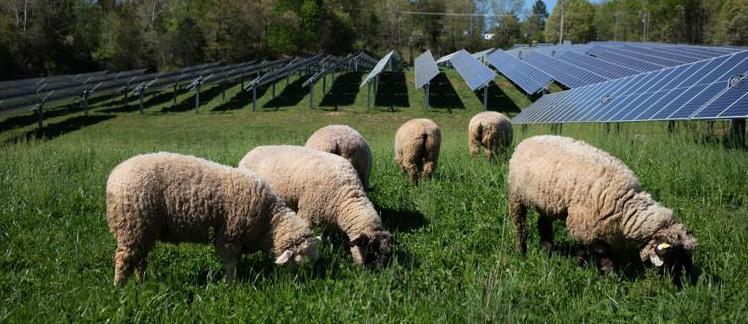
MyGreenerPlanet is socialising involvement in the reduction of carbon emissions and allow everybody to participate; Companies, Customers and Staff.
MyGreenerPlanet will expand the types of assets available to include environmental and sustainability projects.
The Company or Individual is in control and can determine how much of the solar farm to buy to produce the exact number of carbon credits they require to offset their GHG emissions, wholly or partly, and achieve ESG targets. The share of the asset can be sold at any time. The shared ownership of an identified asset producing carbon credits is approved by the Federal government's Clean Energy Regulator (CER) cleanenergyregulator.gov.au
Certification of the carbon credits is provided by the CER. Real time data is provided to Companies via the online portal on operations and performance, as well as quarterly reports and audited accounts.
MyGreenerPlanet eliminates the third-party traders and brokers who control the carbon markets and places the Company in control.
MyGreenerPlanet has empowered Management and Staff to utilise MyGreenerPlanet in many different applications to enable Staff, Customers and Suppliers to become involved with the Company in buying a share of the asset and sharing the rewards.
Companies can demonstrate to Staff their credentials in providing a workplace of positive achievement in environmental stewardships.
Companies have involved their Customers and Suppliers in MyGreenerPlanet to create a joint endeavour with the single purpose of reducing carbon emissions and jointly addressing the issue in a positive way.
The linking of the Company's product or service with the social good of tackling climate change has increased the value of the Company's offering and accordingly. Customers have been prepared to pay a premium for the product and act as a public promoter of the Company.
A net zero future is being realised one action at a time in the Northern Beaches.
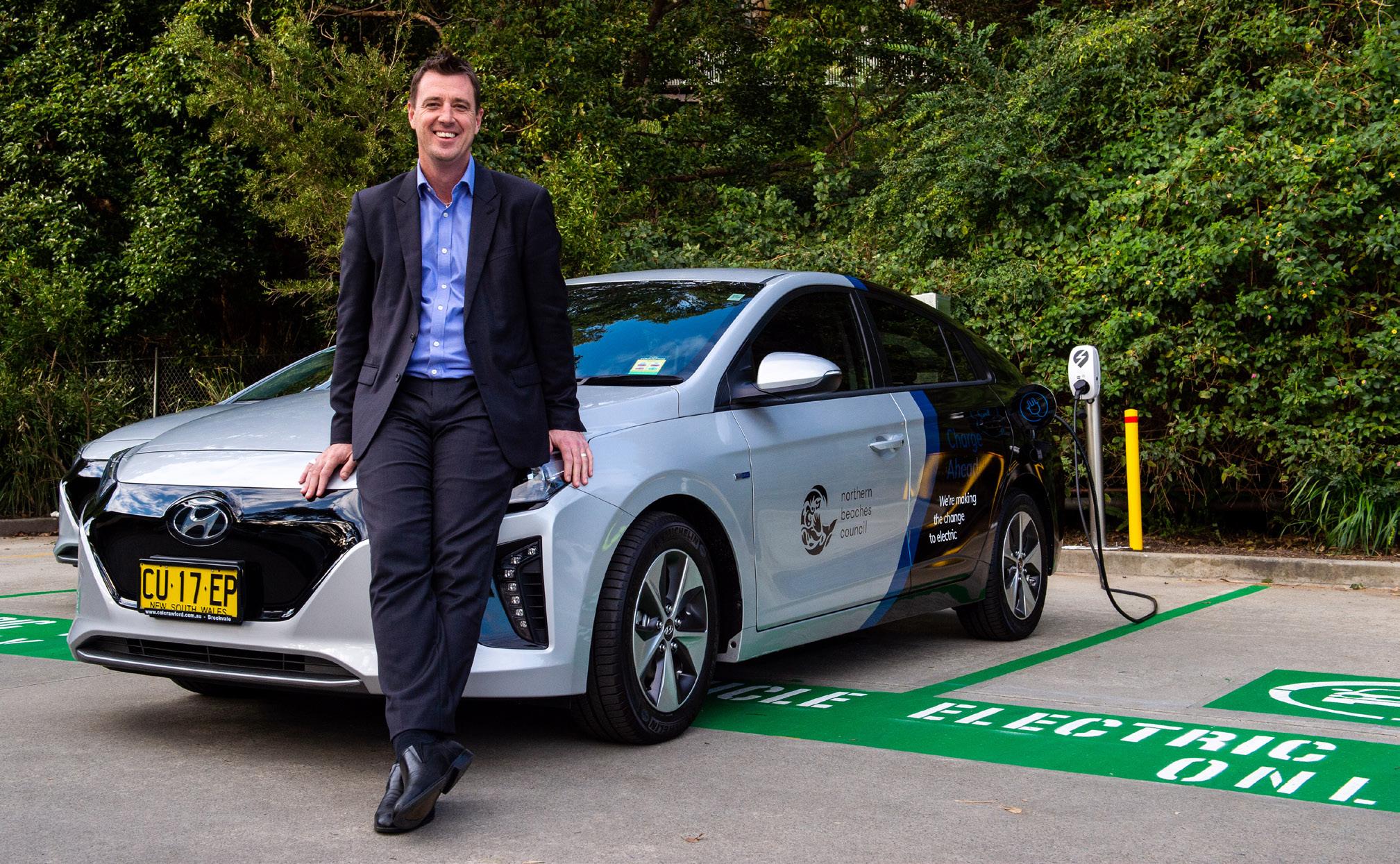
This project - Protect. Create. Live –Environment and Climate Change Strategy 2040 (ECC Strategy) - brings together community and Council in united action to protect our environment and sets a commitment to reaching net zero emissions.
It delivers ambitious, industry leading commitments and aspirations to drive the urgent action needed to address the challenges faced. The strategy delivers on international obligations including 9 UN SDG’s, the 2015 Paris Agreement and National and State Government targets.
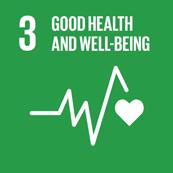
The ECC Strategy and targets are supported by:
• Detailed short term action plans
• Our first resilience strategy
• MOVE Transport Strategy 2038A walking and biking plan that include targets and actions to reduce emissions from transport
• Policies that enable both the community and Council to change behaviour such as the single use plastics policy
Actions have resulted in:
Corporate results
• Signed 100% Renewable Electricity PPA
• Installed over 940kW
• Implemented 20 energy efficiency upgrades
• Saved ≥10.95 tCO2e (tonnes of carbon dioxide equivalent) through a sustainable concrete trial
• Achieved a 65%, or 71,700 tonne, diversion of waste in FY20/21
• Installed 16.7km of new footpaths, over 300 new bike parking stations and 5 repair stations
• Reduced corporate fuel use by 12% over 3 years
• Running the Bulky Good Timber Trial
Council has have proven its commitment, achieving two of these well ahead of time including an ~80% reduction in corporate emissions and a 6% reduction in community emissions.
Council learned the value of targets, leveraging community momentum, addressing barriers and fostering meaningful partnerships.
Now in its third year of implementation Council have already:
• Met two corporate commitments nine years early:
• All suitable sites to be powered by renewable electricity by 2030
• Reduced corporate carbon emissions by 60% by 2040
• Published the Climate Change and Environmental Education and Sustainable Living Action Plans
• Met two Cities Power Partnership Pledges
• Achieved an ~80% reduction in corporate carbon emissions with >$2.4M in expected savings over 7 years
• Reduced community emissions by over 70,000 tonnes
• Sydney Water - Savings Partnership has achieved 125,800L/day water saving, implemented and engaged across 46 participants
• Planted more than 20,000 plants
Community results
• 735 residents requested solar or energy efficiency quotes and 668 people attended information sessions. Solar in the community has increased from 9726 to 15,214, which is saving almost 80,000 tCO2e each year
• Attendance of 22,400 students and community centres at the Environment Centres with 5,800 plants given to residents
• 200 businesses participating in the Swap for Good Program
• 30 community groups leveraged $80,000 in environmental grants

• Over 100 businesses participate in our Sustainable Business Network The programs are supported by marketing and engagement campaigns and Council is supporting its peers on their own journey. Leaving a legacy of accelerated action on climate change has been their biggest success from this project. They have hit the ground running implementing the strategy and achieved so much already.
There is no time to slow down now, they will continue to evolve their programs and seek opportunities to accelerate innovations to track to a net zero future.
Orica Kooragang Island striving towards net zero emissions by 2050.
Orica’s purpose is to sustainably mobilise the earth's resources through providing our customers with smarter solutions, optimised operations and partnering for progress. Orica is committed to working with government, industry, customers and community to forge a pathway towards decarbonisation through tangible action and collaboration.
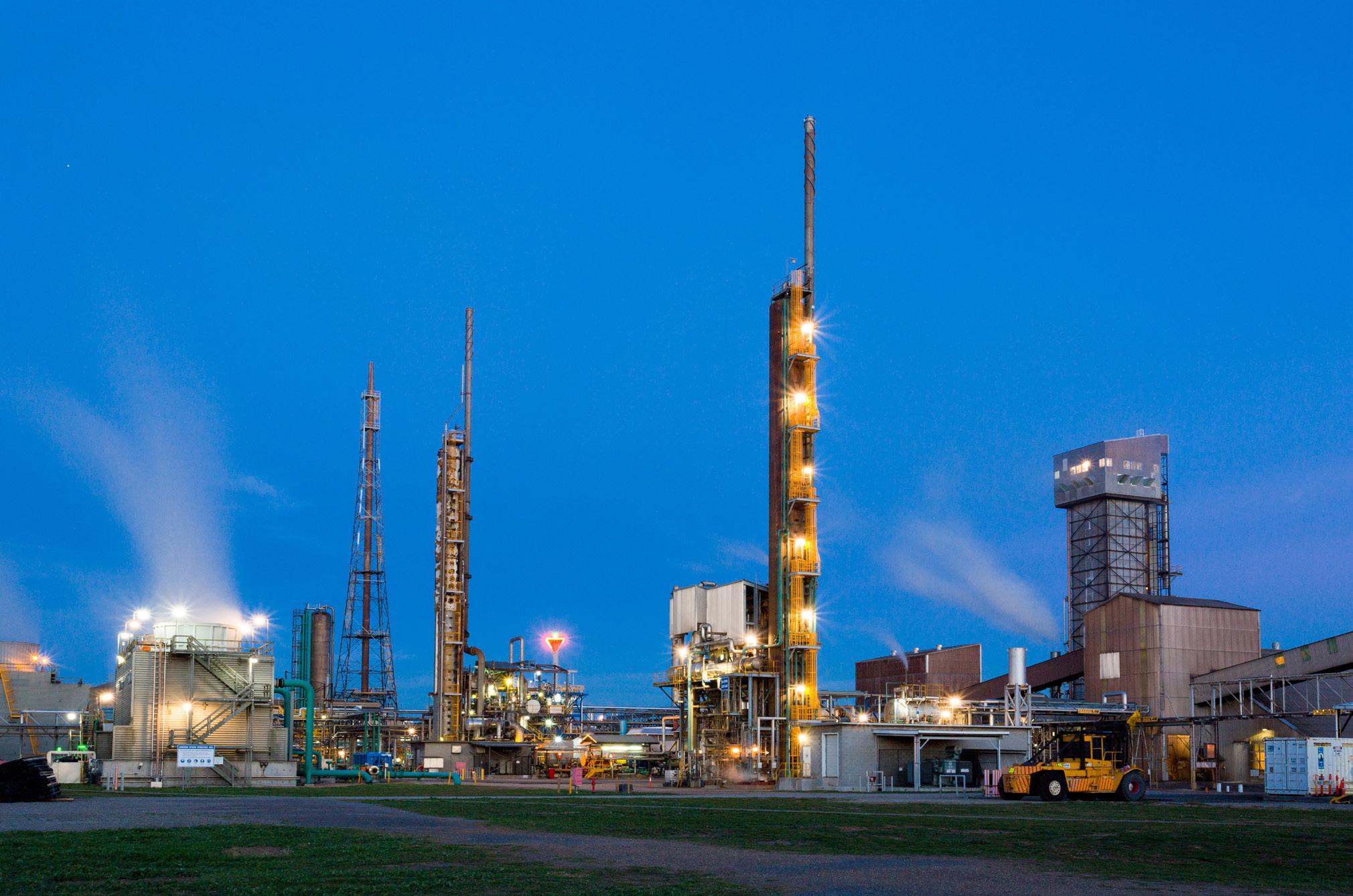
Orica’s Kooragang Island manufacturing site, located in Newcastle, operates an ammonia plant, three nitric acid plants and two ammonium nitrate plants. It produces approximately 430,000T of ammonium nitrate annually and contributes to 59% of Orica’s overall direct GHG emissions, based on 2019 data (equating to approximately 1,180,000T CO2eq per annum).

The site has developed a comprehensive decarbonisation strategy, which will reduce its GHGs by over 50% by 2025 through the following initiatives.
The site is in the final stages of installing Australian-first tertiary abatement on its largest nitric acid plant, with the technology to be operational in October 2023. The remaining two nitric acid plants will have the same technology installed in 2023. This $37M project will reduce the site’s GHG emissions by approximately 567,000T CO2-e / per annum, which represents a 48% reduction to the site’s GHG emissions profile and equates to approximately 11% of all chemical industrial process GHG emissions in Australia.

To deliver on this purpose, Orica has embarked on an ambitious strategy to reduce Scope 1 and Scope
2 greenhouse gas (GHG) emissions by at least 40 per cent by 2030 (based on 2019 levels), with a further ambition to achieve net zero GHG emissions by 2050.
Orica has entered into a Power Purchase Agreement (PPA) with Lightsource BP for renewable electricity generated from its Wellington North solar farm. This will generate 100% of Kooragang Island’s electricity requirements and reduce Orica’s global Scope 2 emissions by over 60,000 metric tonnes of carbon emissions annually.
Orica signed a Memorandum of Understanding with Origin Energy in February 2022 to evaluate the feasibility of establishing a green hydrogen production facility (Hunter Valley Hydrogen Hub), and downstream value chain opportunities. The hub is proposing to produce green hydrogen from recycled water sources and renewable electricity, using a grid connected 55MW electrolyser.
With support of a $14.6M grant from the Australian Government, a CCU mobile demonstration facility is being designed and commissioned by Mineral Carbonation International at our Kooragang Island site. It’s scheduled to be operational in 2024, and will have the capability to capture 3000T CO2eq per annum generated from our ammonia plant.
Natural gas efficiency initiatives in our Ammonia Plant and catalyst optimisation trials on the site’s nitric acid plants are ongoing and have resulted in a 13% reduction of total site GHG emissions since 2019.
We believe that
Orica’s Kooragang Island operations will not only enhance our business performance, but also benefit our customers by reducing the intensity of our ammonium nitrate products. This benefit will also extend to the local community through improved environmental performance of our plants and job creation opportunities.
Strongly believing in educating, engaging and empowering people on climate change and food security solutions, in 2014 Dr Anika Molesworth created a platform to share current and credible for those working on-theground and in-the-field, as well as the community at-large.
Anika established Climate Wise Agriculture with a modus operandi to facilitate the flow of information and build rural capacity.
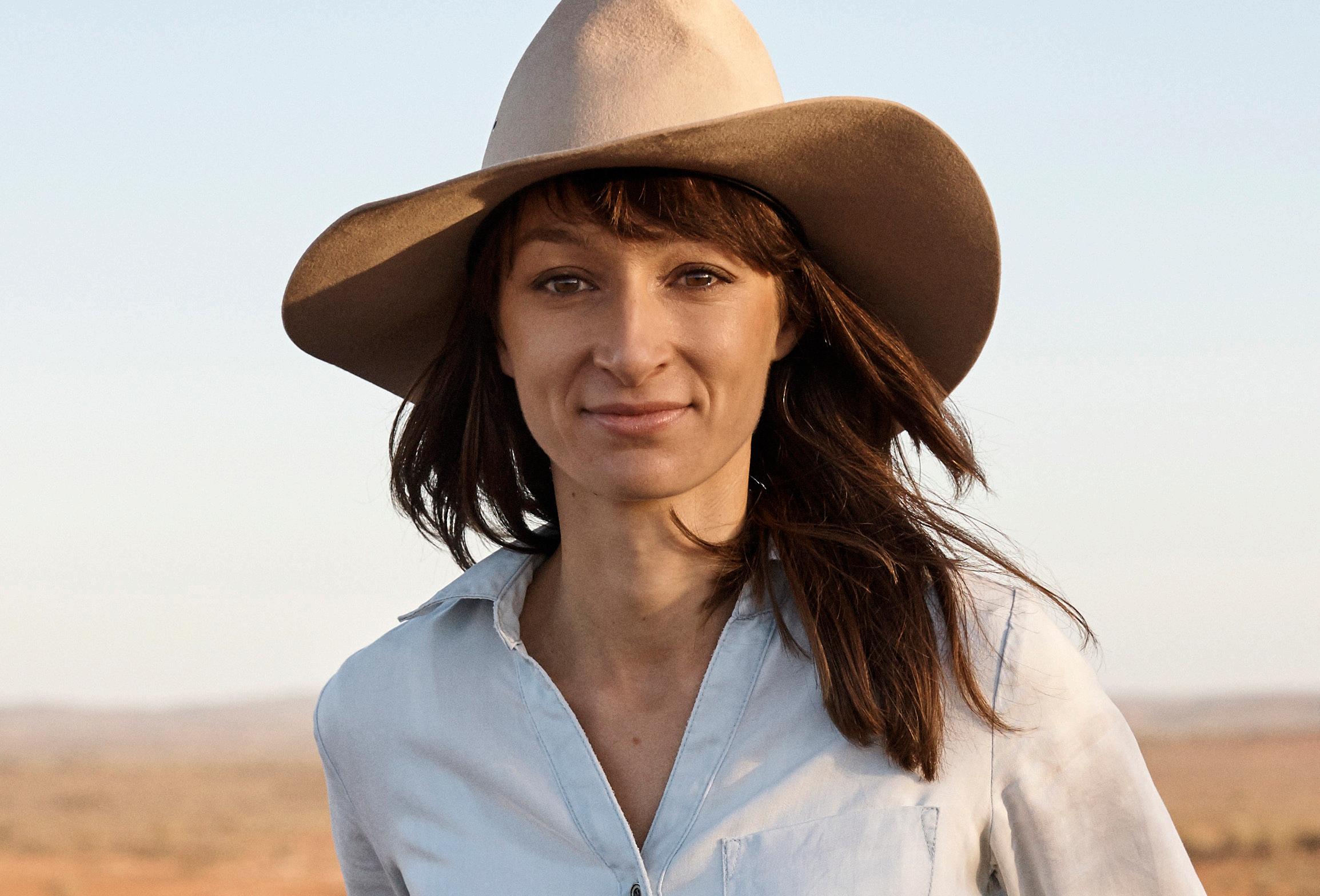
From this work and rural climate advocacy, she was awarded Young Farmer of the Year, in recognition to the contribution made to changing rural narratives towards climate solutions, which led to the creation of the Rural Climate Leadership Initiative.
The poor rural farming are the first and the worst affected by climate change. By assisting rural people to understand the climate changes occurring, the implications and the opportunities, it is possible to build rural resilience along with healthier and more stable communities. Knowledge is delivered on how climate change influences and is influenced by farm and food systems, and training provided on climate wise agricultural practices, as well as personal and community wellbeing.
What makes Anika’s dedication to her cause so apparent is her desire to bring others along with her. In particular, she has great interest in building the capacity of young rural people to speak out and stand up for these important issues relating to food security, gender quality, climate change and environmental conservation.
This enabling initiative helps makes it possible for rural people to overcome adversity, implement innovations, take part in decision-making, and create resilient communities.
Joshua promoting the relevance of culture and Indigenous practices through a practical lens, demonstrating this work through action while theoretically describing and recording it through various mediums. His work combines the old and the new, weaving them together to develop new insights and findings.
Each day, Josh's work seeks to connect the oldest living culture in the world with modernity, promoting the relevance of culture and Indigenous practices through today's lens.


Through his conversations and efforts, Josh connected the agricultural world with environmentalism, acting as a national conduit and leader for environmental and agricultural discussions. He was recognised for his work by being named the Australian Geographic Young Conservationist of the Year, an ACT Young Australian of the Year Finalist, the Young Sustainability Champion by the NSW Government and in the Impact 25: Social sector's most influential people.

Josh is undertaking a PhD at Charles Sturt University, focused on the concept of Indigenous modernity through agriculture. He was recently recognised internationally for his work, announced in the inaugural 50 Next: People Shaping the Future of Gastronomy cohort. Josh is on the board for KU Children's Services, Indigenous Business Australia, the NSW Aboriginal Housing Office and Reconciliation NSW.
Josh is an entrepreneur and business advisor, working predominantly in the Aboriginal cultural, agricultural and environmental spheres. He has worked with numerous of not for profits, businesses and the Government to develop change and bring people on a journey of transformation.

Josh embodies the sustainable development goals through all his work, connecting life on the land with reducing inequalities for Indigenous and non-Indigenous peoples, while incorporating climate action into processes for responsible production.
These practical activities ensure decent work and economic growth in the regions while enhancing wellbeing and providing quality education for others (both nationally and internationally) to continue working.
Josh pursues transformation through modern truth-telling, bringing new concepts to the forefront through the acknowledgement of the past.
Anita's work on social media platforms aims to encourage young people to be more conscious citizens. It aims to encourage people to care more about climate change using videos, photos and text.



The aim is to encourage small consistent changes such as reducing food waste to reduce their carbon footprint. It is an open and welcome platform that promotes diversity and also is a gentle call to action that invites people into the climate action cause.

Dr Anita's social media presence has grown from strength to strength having being featured on Good Morning America, The Washington Post and also national press coverage such as The Sydney Morning Herald and ABC News.

Dr Anita Vandyke is a medical doctor/engineer/author/sustainability advocate. She is the author of two best-selling books called A Zero Waste Life and A Zero Waste Family published by Penguin Random House. Her first book A Zero Waste Life has been published in seven languages and has won Gold in the Nautilus Awards.
The book is a practical guide for people wanting to reduce their waste and also not waste their lives away.
It is a focus on being an everyday activist, that aims to encourage people to reduce their environmental footprint in a gentle but realistic way. She also encourages people to live more sustainably through her Instagram page which has 90,000 followers (@rocket_ science)
The goal at Banish is to give Australians all the tools they need to reduce their waste and ecological footprint. With the lack of transparency and reliable information that dominates the industry, Banish focuses on education and engagement with stakeholders.

As a social enterprise and B Corp certified company their aim is to leave a positive impact on the planet, educating, empowering and inspiring Australians to take climate action.

With a successful career in the media industry journalist, sustainability expert and speaker Lottie Dalziel, Founder of Banish, uses these skills to communicate sustainable messaging with audiences from Banish's own, to small groups as well as the greater public.
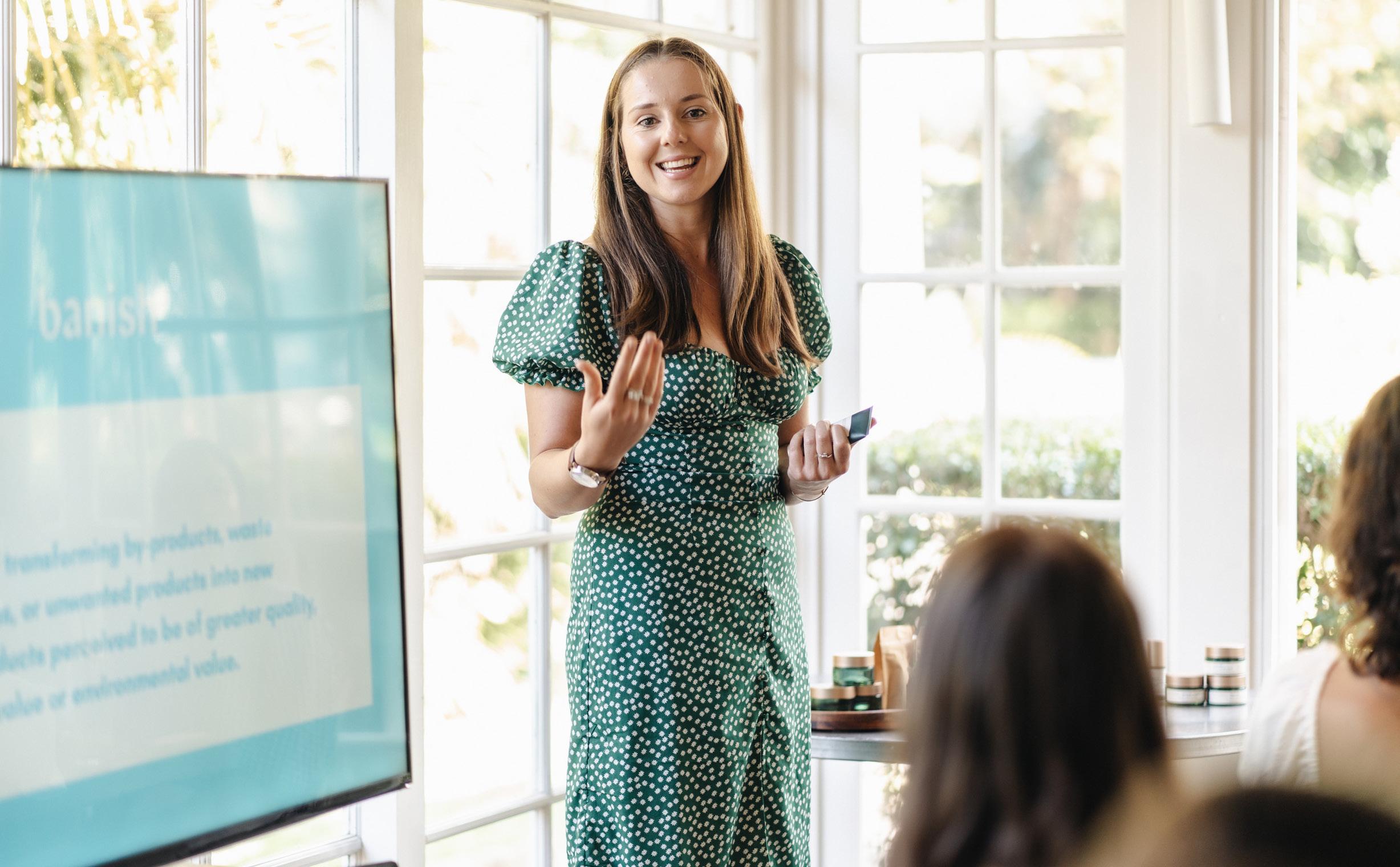
Banish has helped 300,000+ Australians to reduce their waste and meet their sustainability goals, by facilitating information and resources. With education at the forefront, Banish has revolutionized the marketplace by tackling the lack of transparency and reliable information that dominates the industry.
The two pillars of Banish's business model: a marketplace and educational platform, coexist and interact in one same space to provide consumers all the support and information they need to reach their waste goals by making more educated and responsible consumer and postconsumer decisions.
Banish is proudly a company that doesn't create any waste. All of their packaging is recyclable or compostable. Additionally Banish has developed the BRAD program which provides Australians with an end-toend solution for some of those hardto-recycle household items such as: blister packs, toothpaste tubes, lotion bottles, coffee pods, bread tags and so much more.
By starting a conversation about the waste management problems Australia faces, and facilitating this recycling and disposal program to everyone in the country, Banish strive to continue growing this program by partnering with other organisations to increase recycling and the exposure of BRAD in Australia.
Australians are deeply and increasingly concerned about climate change. According to ABC Vote Compass, more Australians said climate change was their number one election issue in 2022 than any other issue, and a majority of people in every electorate support meaningful action on climate change.

In the lead up to the 2022 Federal Election we began to feel that our peers: although passionate about climate action, lacked enough knowledge about the candidates in their electorate to vote with climate at the forefront. The information available was not always easy to access or understand, which meant that many voters, especially young people, were resigned to default to habitual voting informed by their family or social networks.
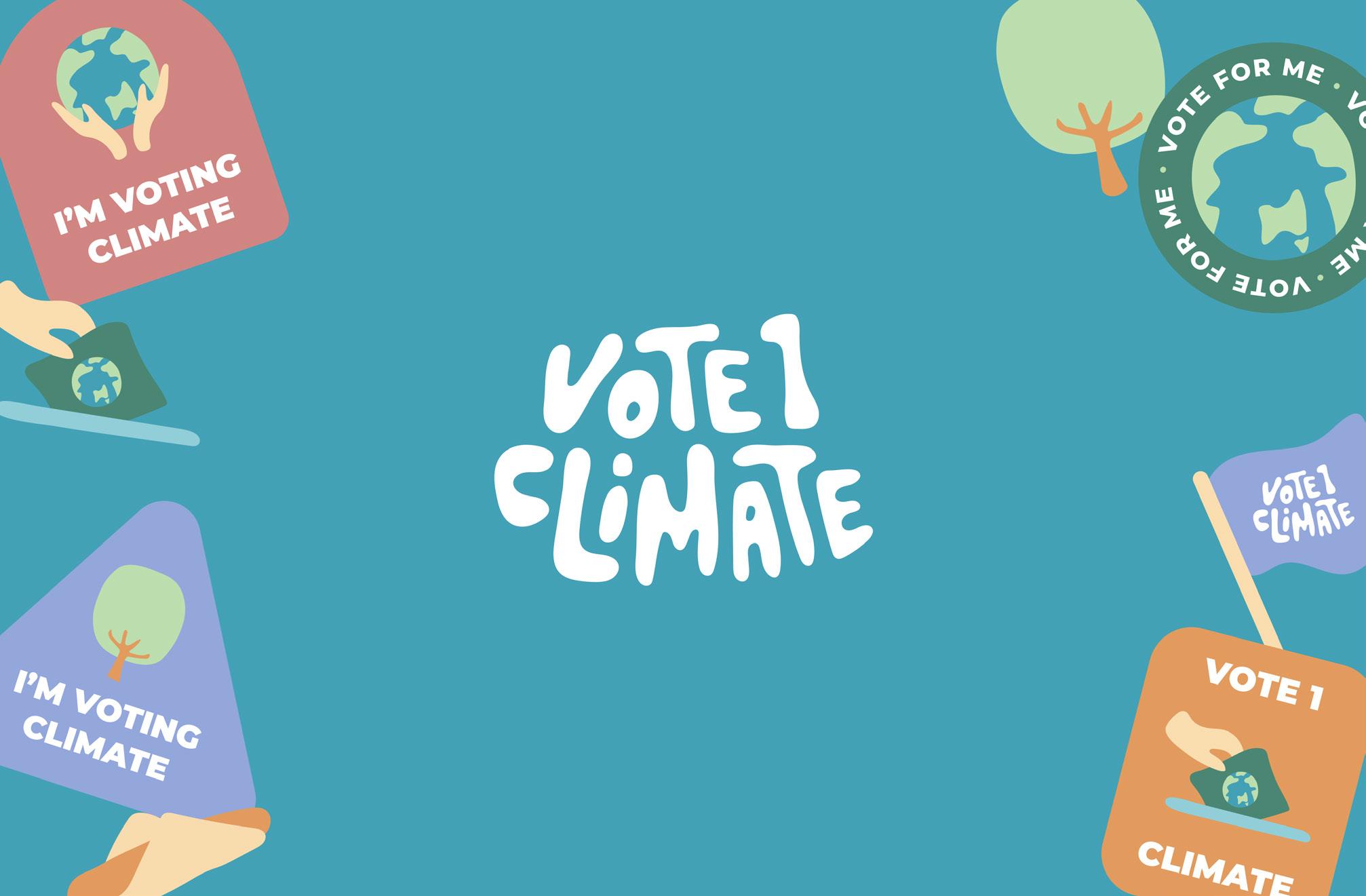
That’s why, for the 2022 federal election, Project Planet developed a free, web-based tool to help Australians put climate first at the ballot box. Vote 1 Climate is an interactive tool that enables voters to assess candidates in their electorate, based on the nature of their climate policies, voting record and party position. The tool helps Australians create a custom how-to-vote card, to centralise climate-action and values in their vote in an informed way.
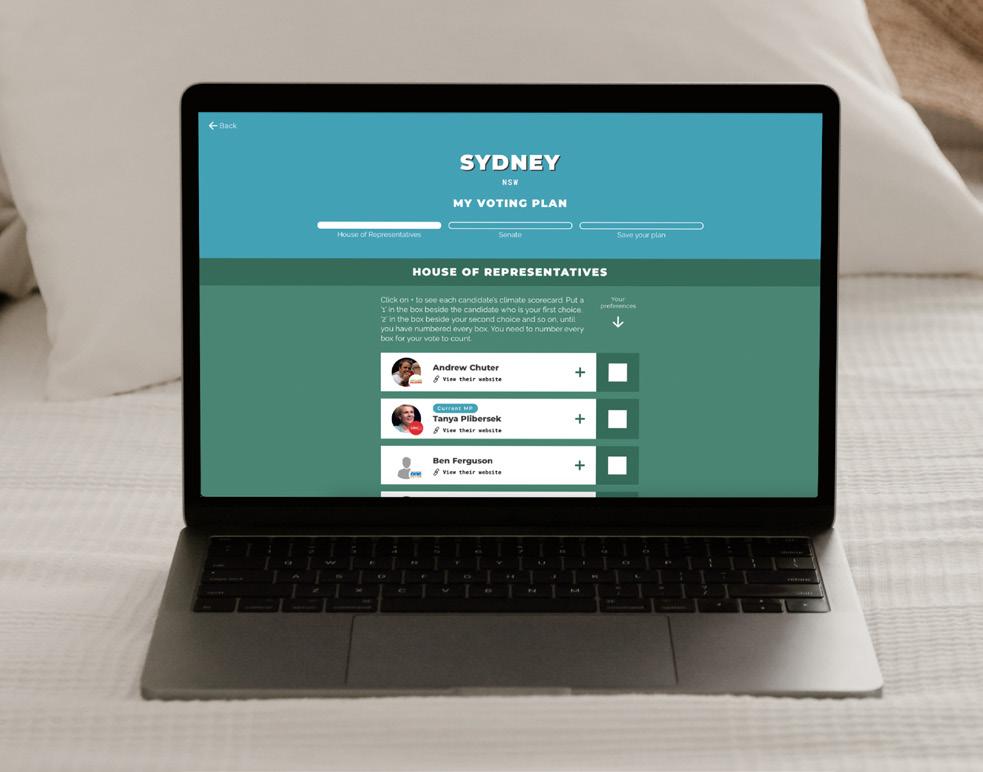
Across the two-week period leading into the election, more than 10,400 people accessed the tool. We received overwhelmingly positive feedback from hundreds of users, and the tool was shared over 1200 times on social media alone.

The enthusiasm for the tool made it clear that there is a genuine appetite for accessible and user-friendly election information, that aligns with voters' values and concerns.
We live in a world where access to information has never been easier. However, understanding and applying this information at the ballot box can often feel overwhelming. Most of our Project Planet team come from the communications and user experience spaces, and so this unique perspective led us to approach the issue in a new and innovative way. Our experience showed us that users are quick to switch off when information becomes boring, overwhelming or complicated and so our priority was delivering high quality policy information in a way that could be directly translated to the ballot box.
We are so excited by the response to the Vote 1 Climate tool and are looking at ways to develop and expand the tool for future state and federal elections. We are also working on additional projects that can better connect Australians and the climate movement more broadly, drawing on our experience and learnings from Vote 1 Climate.
While climate change can feel like an insurmountable challenge, we are building the digital infrastructure that can help Australians turn their interest and concern into action.
The Swag and Veggie Saver are intelligent, 100% natural, non-toxic, patented produce bags, scientifically proven to keep fruit and vegetables fresh for two weeks or more crisper in the fridge.

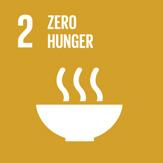
Since achieving incredible success with Swag Australia’s first patented invention, The Swag - the original intelligent produce bag - saw over 1 million units sold, an endorsement from Oprah, an offer on Shark Tank, and thousands of five-star reviews. The company saw high demand for a global solution that could create a massive, positive impact, quickly and responsibly.
Swag Australia has since expanded and is tapping into new-world markets with its latest wholesale brand, Veggie Saver.
Swag Australia ideated, developed and produced the Veggie Saver brand and its single SKU (stock keeping unit) product in response to the global COVID-19 pandemic. After Swag Australia lost the entire wholesale arm of its business (The Swag), and was relying solely on D2C (direct-to-consumer) sales, managing director and founder, Peita Pini, realised that it was crucial to create a standardised product made specifically for retail distribution. The swag needed to be manufactured faster, have shorter lead times, and cheaper manufacturing costs due to less manufacturing “down time”.
Food waste is a global problem. One third of all food produced is lost or wasted, and this equates to around 1.3 billion tonnes of food.
In Australia alone, the nation wastes 7.6 million tonnes of food each year. On top of that, the world recycles less than 10% of plastic created. Veggie Saver was born out of demand for a global solution that could create a massive, positive impact, quickly and responsibly.
It was important for founder, Peita Pini, to create a business that responded to these global issues and delivered meaningful and measurable change.
Veggie Saver is made out of multiple layers of 100% unbleached, unseeded cotton - cotton in its rawest and most natural state. While the product is designed to last years with proper care, Veggie Saver is made from natural materials, which allows the bag to be completely compostable, and is food safe. The Veggie Saver explainer video further demonstrates how the product works and how to use it.
Veggie Saver is an innovative product that is the perfect gate-way for those who are new to sustainable and natural products, and comes packaged in a box which highlights its unique selling points, gives instructions on how to use it, and includes a QR code which links to the explainer video.
Veggie Saver sells itself at the point of purchase, and is an ideal wholesale product to be sold alongside fresh fruit and vegetables. The box can be merchandised on a clip strip, which reduces shelf space and gives retailers incremental revenue.

With little market competition and intelligent product innovation, Veggie Saver is a trailblazer in reducing the cost of fresh produce to the household budget, food waste and plastic pollution.

Beautiful gardens, healthy landscapes, a transformative initiative protecting Australia’s biodiversity.

The gardening responsibly initiative is science based, that aims to help 11 million Australians create healthy, beautiful gardens, that reduce the risk of landscape-scale weed invasions impacting biodiversity. It uses a market-driven, collaborative and inclusive approach to help transform the way small to medium businesses operate in the horticultural sector.

The initiative includes a “certified gardening responsibly” eco-label, which provides a clear visual identity to empower consumers to easily select products that are better for the environment. This also enables businesses a point of difference that allows them to proudly display quality environmentally-sustainable products, to increase business profitability.
Plants are determined low-risk by a ground-breaking, internationally recognised scientific risk-assessment tool developed by Macquarie University. The online platform includes an accessible research portal to help to grow everyone’s understanding of plant traits that pose invasion risk. It is open-source to allow experts to input information, meaning more plants can be assessed and certified as low-risk of impacting natural landscapes.
Comprehensive audience segmentation and behavioural economics underpinned the communications and marketing strategy, enabling the initiative to drive lasting change in the ornamental plant market.


The campaign will use social media influencers and content creators, paid social and earned media coverage to reach over 11 million Australians. It will also leverage the Gardening Responsibly community network by providing community and business marketing kits to exponentially amplify its reach. Already more than 23,000 small and medium greenlife businesses have access to the kit, which will also help them engage their stakeholders, support their business growth and market differentiation.
The initiative has established new networks, collaborative partnerships, and ongoing relationships that bridge connections between environmental conservation, biosecurity regulation, commercial trade, and the general public. It directly supports progress towards Sustainable Development Goals 8, 9, 12, 13, 15, and 17. Ultimately the initiative will have a lasting impact on Australia’s biodiversity and natural landscapes. It has created a win-win scenario that helps businesses transform and ‘do well by doing good’ (competitive advantage by growing/selling lowrisk plants) and enables consumers to have beautiful gardens, while also supporting healthier landscapes into the future.
Gardening Responsibly is set to transform NSW’s horticulture and greenlife industries, and the way Australians choose plants. The next step for the initiative will be to address the issue on a national scale.
The Gardening Responsibly initiative is transforming the $12 billion greenlife horticulture sector, helping businesses, communities and consumers play an active role in addressing Australia’s invasive weed problem that threatens our biodiversity and costs Australia $13.6bn every year.
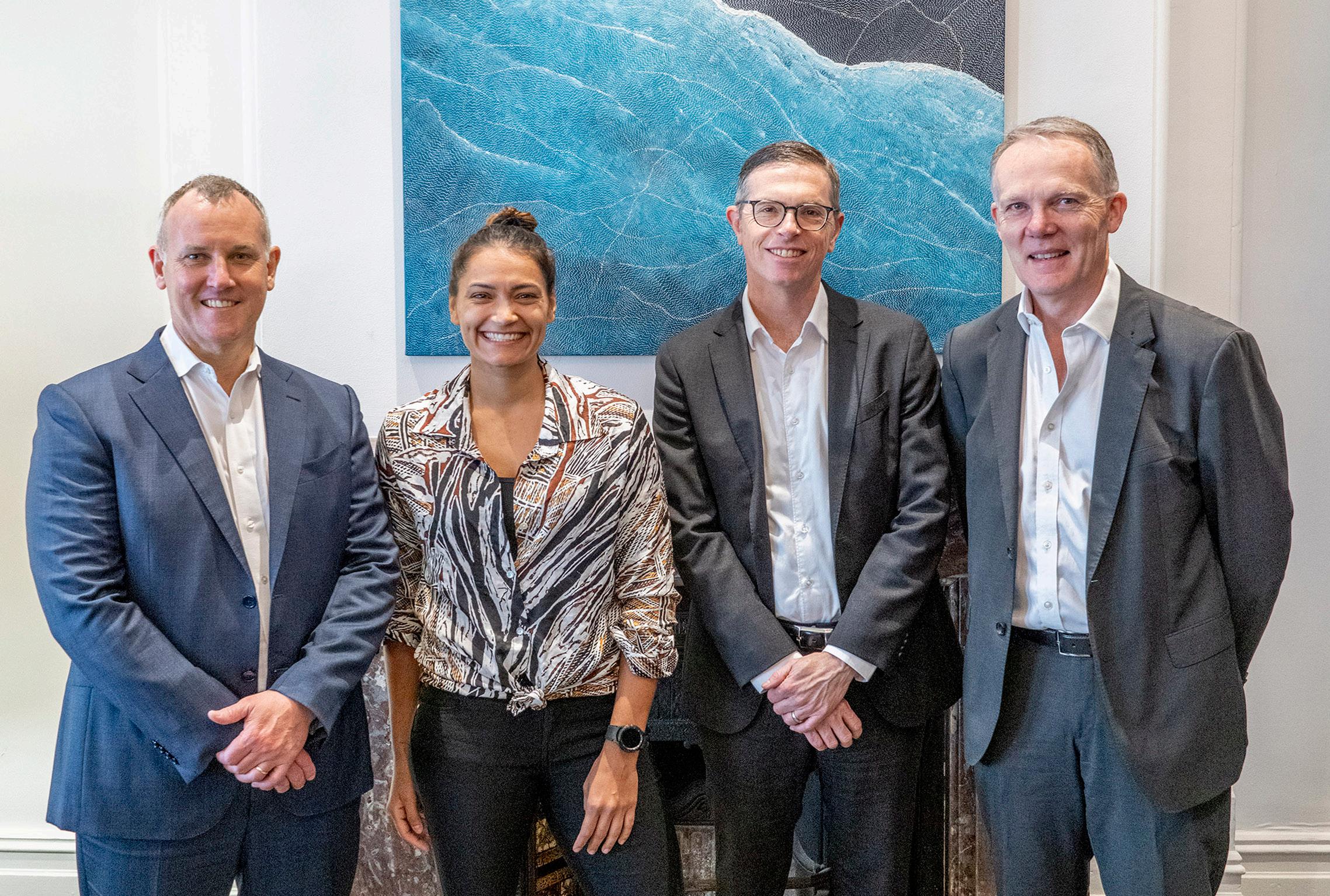
Metrics Credit Partners (Metrics) is a leading Australian non-bank corporate lender and alternative asset manager. Metrics offers tailored borrowing solutions to businesses of all sizes and across all industries in Australia, New Zealand and Asia. Through its managed funds Metrics provides access to the Australian private debt market to investors, ranging from individuals to global institutions.
Like many investors, Metrics believes that sustainability issues present both risk and opportunity, for it and for the entities in which it invests. Its approach to responsible investment and sustainability is growing in importance as regulation, climate change and societal expectations evolve. And, like most businesses, Metrics is experiencing greater interest from stakeholders in relation to its efforts.
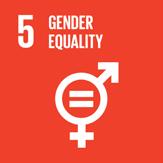
In a truly transformative year, Metrics has built a platform from which to consolidate and grow its position as the leading provider of non-bank finance to Australian corporate borrowers, underpinned by its commitment to embedding sustainability in everything it does.
Key achievements have included:
• Being named as one of The Australian Financial Review's Sustainability Leaders for 2022 They were awarded the special distinction of Societal Benefit Innovator in relation to its Aboriginal & Torres Strait Islander Business Loan product, a key element of its inaugural Reconciliation Action plan
Metrics acknowledges that, as a fund manager, the main channel through which it can influence the real world is through the entities in which it invests. The launch of the internationally recognised Sustainability Linked Loan Principles in 2019, catalysed rapid growth of a niche loan product that offered Metrics an opportunity to engage more directly with its borrowers on sustainability. The enhancement of the Principles in 2021 signalled that the market had fully embraced the product.
However, the notion of asking its investee companies to meet standards that Metrics had not yet met did not sit well with Metrics’ Managing Partners. They therefore set about leading by example.
By ‘walking the talk’ Metrics is distinguishing itself from its peers, and learning first hand about the practical challenges that its investee companies face on their sustainability journeys. It hopes to leverage that experience by rolling out a program of sustainability initiatives designed to assist them.
Metrics formed a dedicated Sustainable Finance team in 2021, based in Sydney, to drive the Managing Partners’ ambition for Metrics to be recognised as a sustainability leader. The team’s initiatives have spanned corporate social responsibility, risk assessment and management, origination and product development.


• Calculating its Scope 1, 2 and 3 carbon footprint and becoming one of the first financial institutions in Australia to commit to setting science-based emissions reductions targets via the Science-Based Targets initiative. Metrics was the first financial institution in Australia and New Zealand to join PCAF, an industry-led partnership to facilitate transparency and accountability of the financial industry to the Paris Agreement
• Developing and implementing a proprietary ESG and Sustainability questionnaire and rating methodology
• Sustainability Coordinator for the world's first Climate Bonds certified Green Units and Australia and New Zealand's first sustainability linked acquisition financing
• Attracting $500m of capital from new responsible investors
SDG Align helps business owners become more resilient by making sustainable development a business habit.
Here’s a company that can help your business understand its contribution to the United Nations’ 17 Sustainable Development Goals, measure progress and plan for impact.


SDG Align helps businesses in the built environment understand where they are at in terms of sustainable development and understand what to do next in order to reap the benefits of doing business for good, through access to their custom designed, award-winning software.
Laid out in 2015, the UN’s 17 Sustainable Development Goals (SDGs) have become a global benchmark to unite industry and government in achieving greater outcomes for the planet and those on it.
The built environment has a key role to play in this, having a major impact environmentally, as well as being where the majority of Australians live, work, educate and generally exist.
“What we do with our software is to help businesses get that broader perspective, get aligned with those broader goals, and then set them on the journey towards sustainable development,” SDG Align’s Willem Overbosch said.
The first step is establishing what businesses are already contributing to the SDGs — as the team has found, “no business is doing nothing”. SDG Align measures how habitual sustainable development is to a business — habit forming behaviour that establishes change.
“They’re all doing something, they’re just not necessarily recognising it as contributing to a sustainable
future. They’re not reporting it, not measuring it and they’re not promoting it,” SDG Align’s Jeremy Rose said.
The self-assessment process delivers a custom dashboard, displaying areas where businesses are doing well and where there is room for improvement, including a suite of priority actions across social, economic and environmental areas.


“Obviously climate action is very high on the list, but we’ve found from a social perspective business interest is also very strong in areas like modern slavery, ethical and sustainable procurement, along with supply chains,” Jeremy said
“There’s also a lot of interest regarding consumer sentiment and understanding how to meet consumer expectations, there’s a lot of opportunity around diversity and inclusiveness.”
Recommendations go deep on areas businesses might wish to focus on, making it easy to follow a specific path of excellence in areas like circular economy, employee wellbeing and so on.
Partnerships with the Building Designers Association of Australia, Strata Communities Australia, Consulting Surveyors National, The University of Western Australia, Monash University and Microsoft in The Netherlands are proof that SDG Align is already having an impact.
Businesses that adopt the SDGs see a return, from customers who are increasingly demanding more social responsibility and are willing to pay for it, as well as better staff satisfaction, performance and retention.
SDG Align is on a journey to make businesses aware and assist them on a journey to make sustainable development a habit, addressing not just the challenge we all face, but the opportunity that it presents.
“Doing business for good is good for business.”
(Source: this is a abstract from our showcase article in the Fifth Estate Green list)
Sydney Market is using its environmental strategy to help stakeholders reduce waste and be more sustainable.

Sydney Markets acknowledges that the reputation of a company and the health of the communities around it are mutually dependent. New opportunities have emerged to create shared value.
Overcoming challenges are rectified and communicated with our stakeholders, to continue to strive for a sustainable balance of doing more with less. If we continue with this approach, we are certain the next generation will adopt and progress forward.
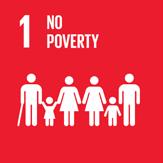
We have encouraged our Tenants to replicate our successful formula to manage food waste more efficiently, to save waste disposal costs and divert food waste in a sustainable method.
Reflecting its role in the sustainable management and conservation of Australia's environment, Sydney Markets Limited (SML) is committed to minimising its own ecological footprint by pursuing environmental best practice, and the prevention of pollution in all operations.

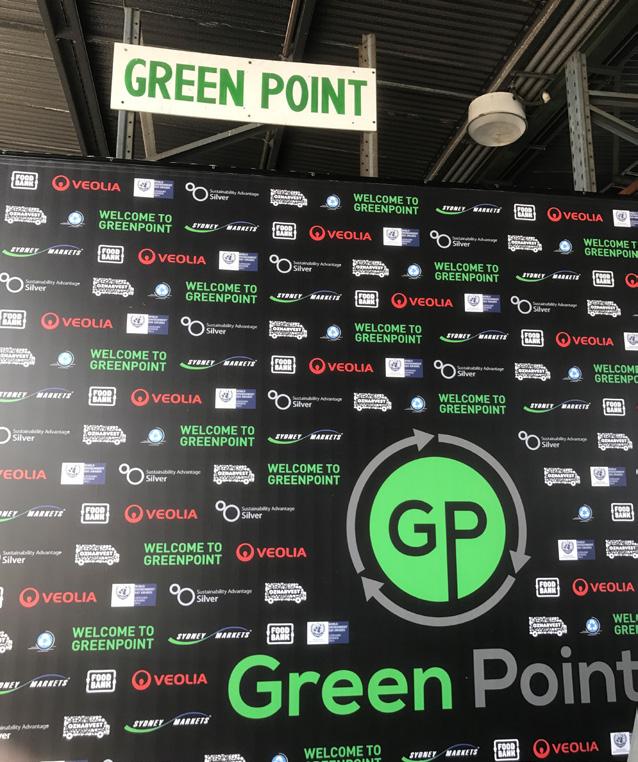
Integrating the Sustainability Goals into a business structure model was imperative to address the three dimensions of sustainable development: social, economic and environmental, as well as important aspects related to peace, justice and effective institutions.
These Policy drivers not only promote our Sustainability KPI’s, but also SDGs.
Port Authority of NSW - embedding, influencing, partnering and collaborating to drive greater sustainability outcomes.
Port Authority set about taking some very large steps towards sustainability in areas that Australian ports were generally hesitant to undertake. Operating in all six commercial ports across NSW, Port Authority is uniquely placed to drive positive change across the maritime and shipping sector of NSW and beyond its own responsibilities.
Two years ago, Port Authority of NSW commenced a journey towards sustainability that would see green shoots appear across the business that are driving real change. It was a transformative journey driven by the passion of the small State-Owned Corporation’s staff, Executive and Board, under the leadership of a new CEO.

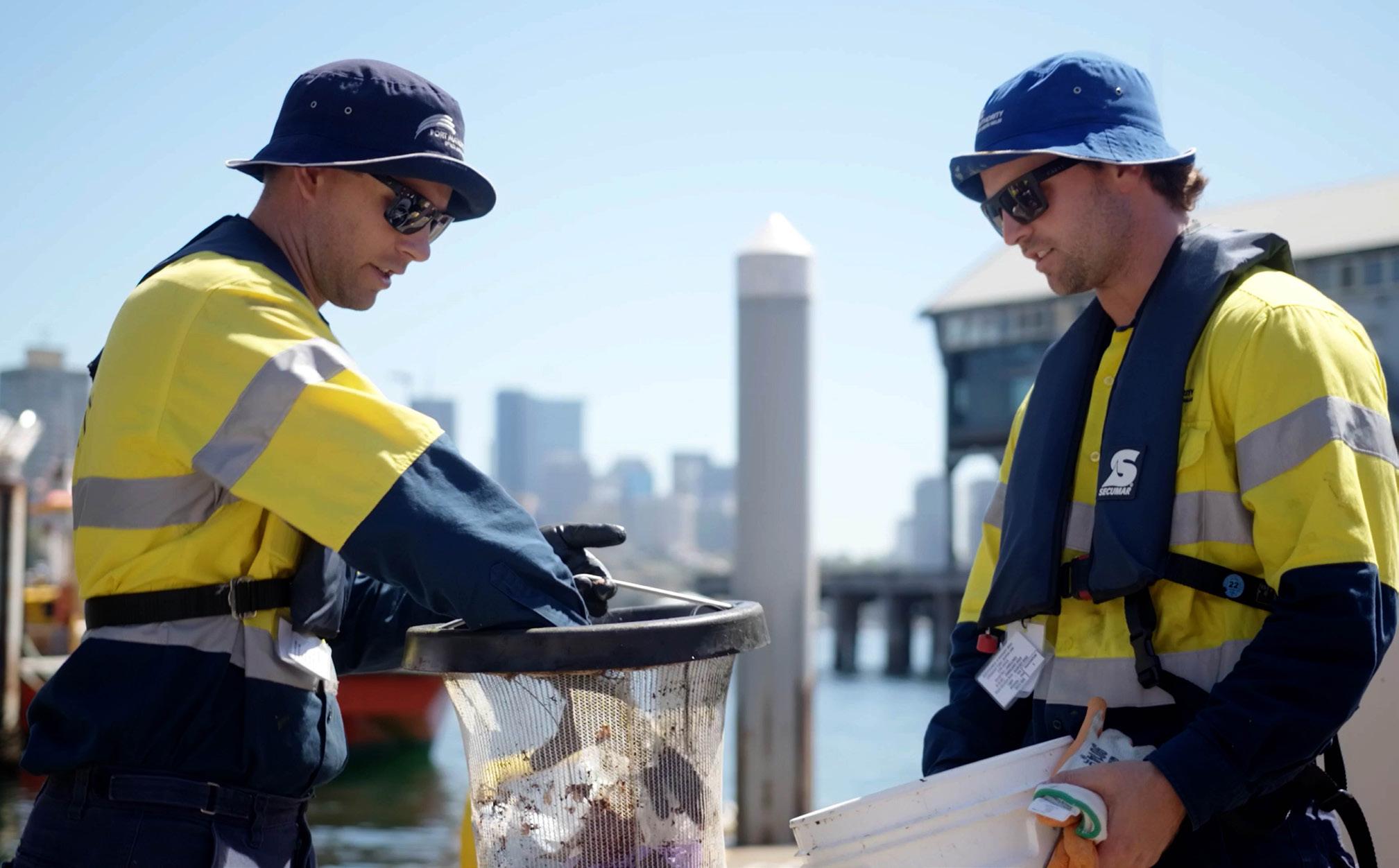
Around 20% of Port Authority’s staff were directly involved in the co-creation of the Sustainability Plan, using the UN Sustainable Development Goals as a guideline to ensure it supported national and international goals and contributes to global sustainability efforts. The process dovetailed into the development of a new Strategic Plan for the business.
Over 40 potential social, environmental, economic and organisational initiatives were prioritised to create a sustainability plan with four key focus areas, 13 opportunity areas and a wide variety of potential initiatives.
Staff at all levels have adopted and implemented sustainability into their way of working, and the result has been a new approach to operating.
In a very short period, Port Authority has managed to embed sustainability into the very values, vision and strategic plans and priorities of the business.
Four significant initiatives identified and progressed have been:
• Navigating to Net Zero by developing a carbon emissions reduction strategy and introducing initiatives to reach its Net Zero targets, but also leading industry and supporting others to achieve the same.
• Implementing industry leading noise management practices for Bays Port, ensuring the amenity of adjacent communities is respected and protected.
• Building sustainability into all procurement by embedding considerations for environmental sustainability, fair trade, transparent and ethical supply chains and respect for human rights when obtaining goods and services.
• Increasing Diversity and Inclusion across the organisation.
Port Authority’s actions have already allowed it to influence, leverage its leadership, and partner and collaborate with key stakeholders to drive sustainability initiatives and outcomes beyond its own boundaries, creating greater positive sustainable change.
Port Authority has committed and announced a worldfirst 100% renewable electricity shore powered precinct and a first shore powered cruise terminal in the southern hemisphere.
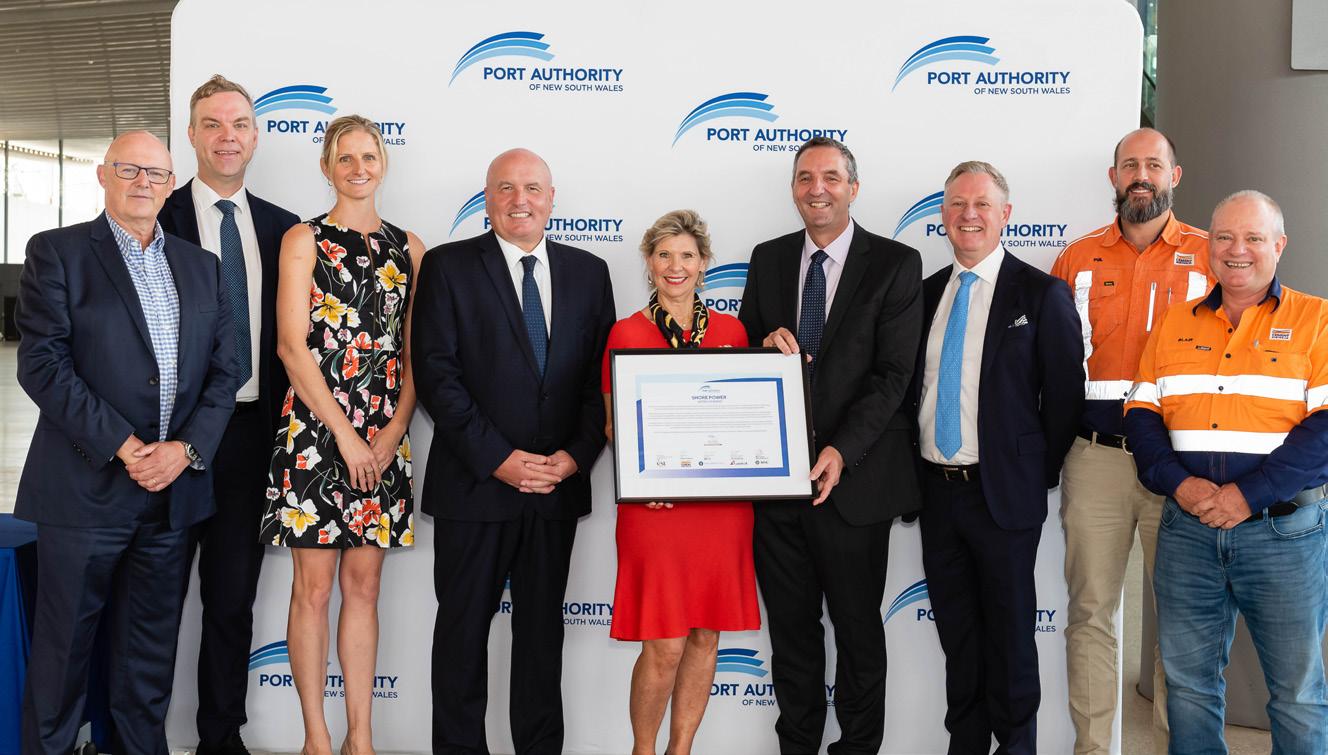

The commitment is a key element of an overall shift to acknowledge, address and reduce Scope 3 emissions from the shipping and ports sector in Australia.
The noise management and energy transition commitments are leading the way on how to be better neighbours and integrate with port communities. Port Authority is participating in key international and national forums that bring together similar minded stakeholders to share learnings and collaborate.
Two years in and the journey is really just starting to get interesting. Port Authority is ready to take on more challenges and continue to collaborate, learn and adapt while remaining bold in its ambitions and goals.
Blackmores, Australia’s leading natural health company, has taken steps to create a scaleable approach for evaluating biodiversity physical and financial impacts that, together with assessment of human rights and climate resilience, are accelerating sustainable progress across their value chain.
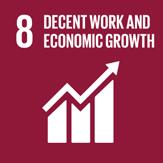

Over the last 12 months, Blackmores has partnered with pollination to complete their first nature-related risk assessment of a key herbal ingredient, informed by the LEAP model in
the taskforce on nature-related financial disclosures beta framework and considering the science-based targets for nature onitiative approach.
This was bolstered by three Nature Risk Assessments of Blackmores’ key facilities also using LEAP guidance.
The outcomes of the Pollination proof-of-concept have enabled Blackmores to apply its Climateresilience Financial Sensitivity Model, to evaluate the financial materiality of biodiversity impacts and inform the development of new processes that are changing the way supply chain resilience is evaluated and reported.
The natural world provides a lot of services for free - like filtering our air, abating carbon, regulating water supply, giving us oxygen, and returning nutrients to the soil. These are known as ecosystem services.
Current and predicted climate-related trends in the herbal ingredient’s growing region have potential impacts on these ecosystem services that should be addressed.
The pilot will inform how Blackmores builds a clear understanding of sustainable sourcing indicators with their supply partners and to nurture a culture of continuous improvement and transparent reporting on the impacts of their supply chain on healthy people, a healthy planet, and healthy communities.

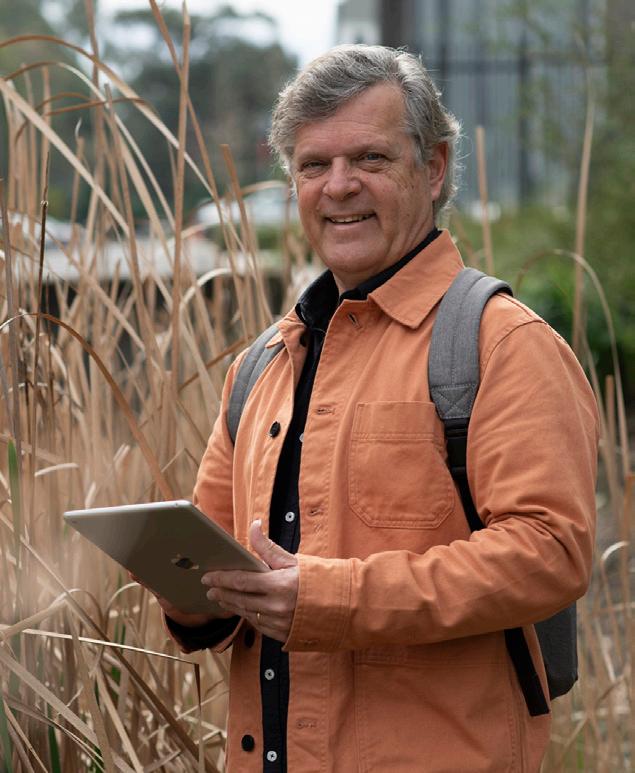
The nature impacts pilot serves as an important adjunct to current work to assess and address human rights risk, and to evaluate climate resilience to protect precious natural medicines for generations to come.
It was enabled by two supplier engagement programs Blackmores established in the last three years: Partnering for Adaptation: an existing program where Blackmores engages supply partners to understand and support further climate resilience within their operations.
Partnering for People: Blackmores' program to assess and address modern slavery risk through supplier education and engagement, risk assessment, independent audit and site visits.
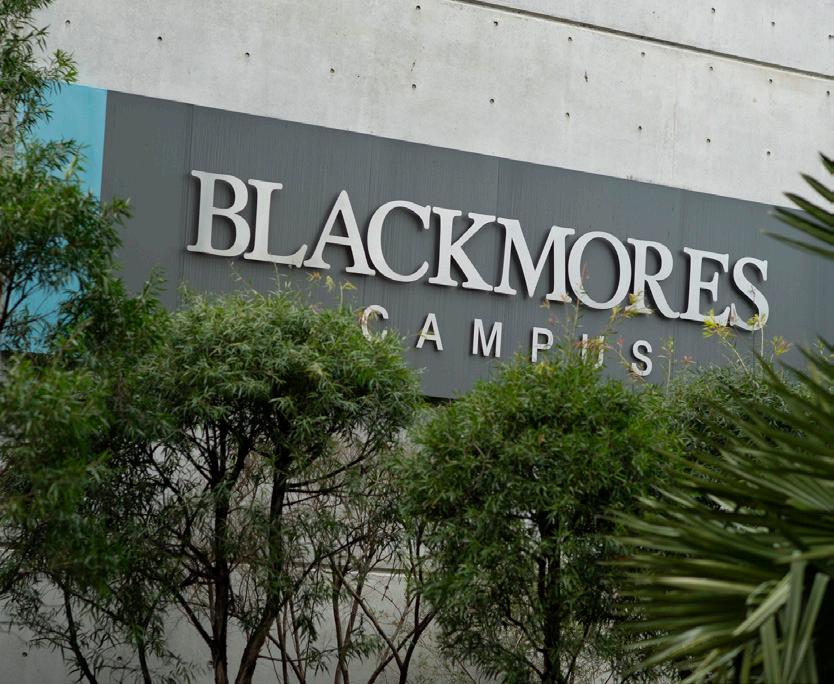
The pilot was possible because of the expertise of Pollination, a climate and nature-focused advisory firm.
The pilot successfully resulted in elevating the protection of nature as a material topic, and there is a strong commitment across the Group to develop this program of work and clear targets as access to data improves.
Blackmores’ pilot of Nature Risk Assessments using the TNFD framework is understood to be an industry first, and paves the way for nature to be elevated on the sustainability agenda for businesses.

Established in 2016, ProAgni is an Australian Ag-Bioscience company focused on improving economic outcomes for producers, whilst helping the industry tackle key global challenges like antimicrobial resistance, GHG emissions and food security.
ProAgni discover and commercialise innovative animal nutrition products. They have developed Australia’s first and only patented and proprietary feed supplements and additives for cattle and sheep that are antibiotic and ionophore free, and deliver increased producer performance and profitability.
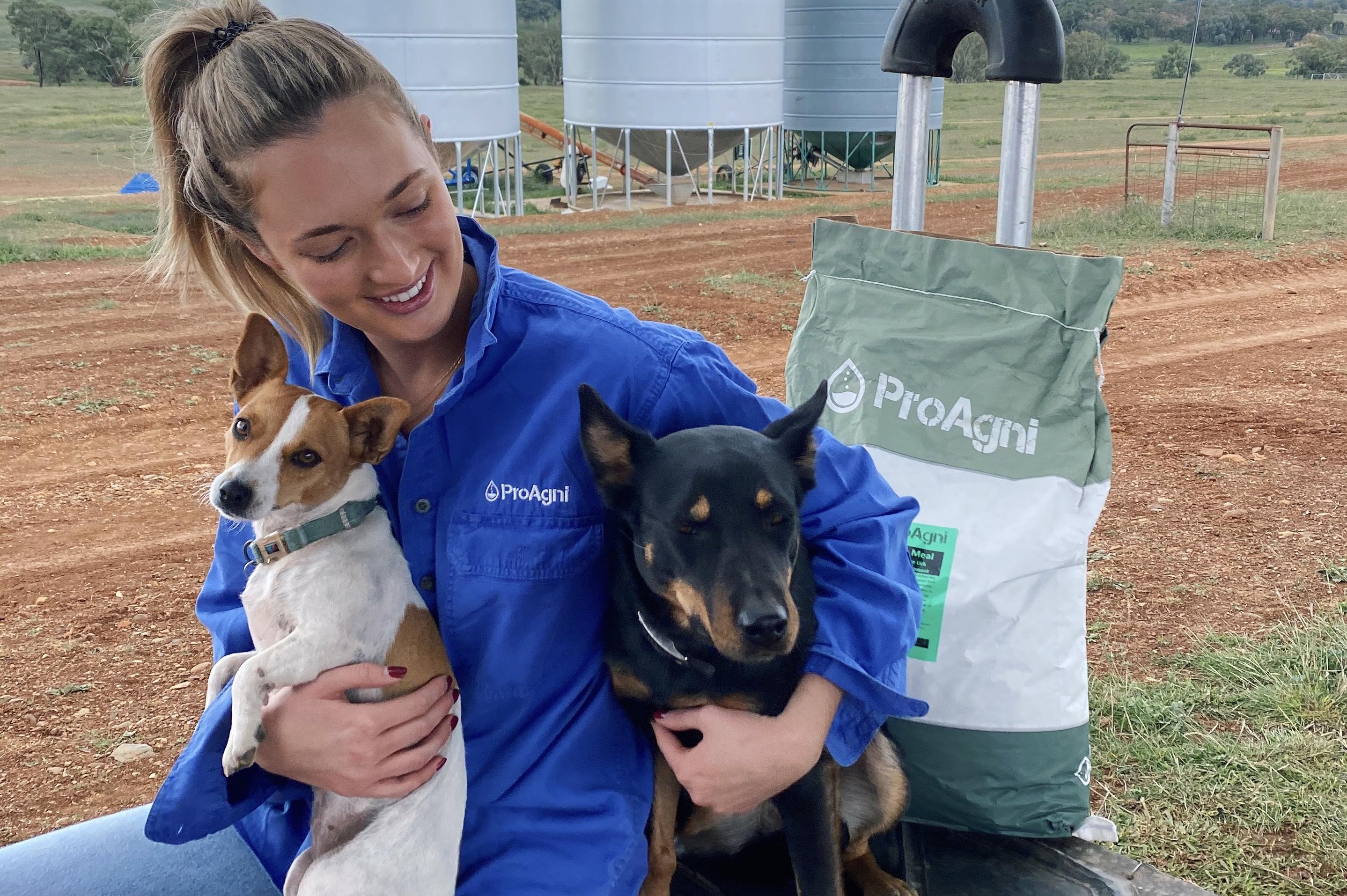
ProAgni has a strong underlying social and environmental impact mission, which includes:
• To accelerate the removal of ingested antibiotics from the animal food chain and reduce Agricultures contribution to antimicrobial resistance in human and animal health. We aspire to make our food and our children’s food safer.
• To reduce waste, emissions and help Agriculture to achieve a carbon neutral goal by 2030.
ProAgni have fed over 2.2 million animals, removed 2.5 tonnes of antibiotics from animal agriculture and reduced over 376 tonnes of methane.
ProAgni products give farmers the tools to produce more efficiently, have a more profitable business with reduced environmental impacts.
And for consumers, that means affordable food, clean food that’s been produced with a deep care for the environment, and for the communities where it is produced.
The ProTect range of feed supplements work to indirectly affect microbial populations in the gut to provide stability and balance of rumen fermentation which, in turn optimises, digestion. The result is more of the bugs you want in the rumen and less of the ones you don’t, thereby improving production efficiency.
The objective of using ProTect is to optimise performance through optimal nutrition, without the need for antibiotics and ionophores.
The existing problem of antibiotic use:
70% of the global use of antibiotics is being used in animal production. This is not for treatment, but to promote growth and transition animals to intensive diets.
This repeated prolonged exposure to sub-therapeutic dose antibiotic compounds, is allowing bacteria to adapt and become resistant to antibiotics used for treatment of illness. This adaption is contributing to the growing global problem of antimicrobial resistance (AMR) in public health, which last year resulted in 700,000 deaths across the globe. $35 Billion was lost in productivity in the US alone and has negative flow on consequences for the environment.
ProTect products have a clear and distinct value proposition in the market as the only product, backed by evidence, which are 100% antibiotic free with superior production efficiency.
On average, customers have experienced a 17% improvement in production efficiency, meaning less feed per kg of gain and lower methane intensity on product produced.
Scientific Validation: ProAgni has invested significantly in independent scientific validation. This includes studies with the University of New England, West Texas A&M, and have current research agreements with DAFQ, CSU, UNSW, CSIRO, and are working with the University of Illinois, UC Davis, and Queen's University Belfast.
ProAgni has a UN SDG Partnership Platform project #SDGAction43468 and are a foundation partner of CRC SAAFE, which was awarded $34.5 Million.
ProAgni are globally recognised for their innovations and passion to transform animal agriculture. ProAgni have been named Finalists in the Grow NY competition and the Beef Alliance Start-up Challenge.


The National Renewables in Agriculture Conference increases adoption of renewables, cutting emissions and building business resilience.
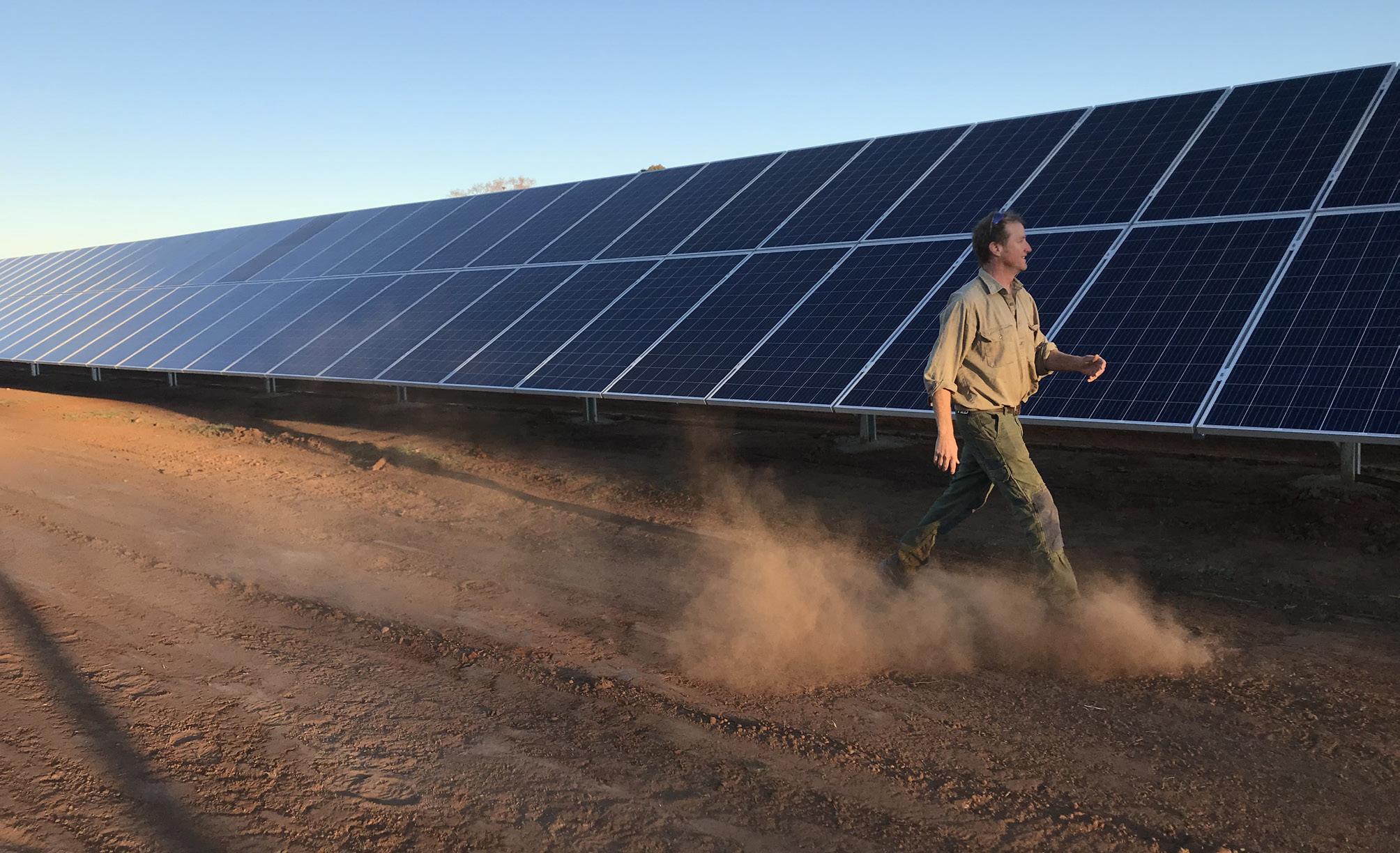
The National Renewables in Agriculture Conference and Expo is designed to overcome the barriers to the adoption of on farm renewables. The Conference is the only national event that brings together farmers, agriculture and energy consultants, peak bodies, research institutes and Government representatives to share stories of on-farm renewables, their business case and what’s driving the transformation of energy use in agriculture.
The long-term objective of the Conference is to increase investment in on-farm renewables, and contribute significantly to agriculture’s path to sustainability.

Farmers adopting renewables is important because it addresses;
• Consumers desires and growing preference for sustainable food
• Rising electricity and diesel costs
• Emissions contributing to climate change
• Showcasing Australian agriculture as innovative and progressive
A Conference Committee was established and has been critical to the event's success. The Committee brings together organisations who share common goals to transition farmers to renewables. Members include Clean Energy Council, NSW Farmers, Queensland Farmers Federation, NSW Department of Primary Industries, Farmers for Climate Action, National Irrigator's Council and the NSW Office of Energy and Climate Change.
Event evaluation demonstrates increased knowledge and intention for investigating renewables, based on what farmers learnt at the Conference.
Some feedback that illustrates the impact of the Conference is below;
“We entered the room sceptical but open minded and left inspired and motivated.” Cate Hardy, Barley, cotton, seed canola and maize farmer, Coleambally NSW
“The conference opened our business eyes in a positive manner that has encouraged us to explore the renewable space.” Billy Browning, Narromine farmer, NSW

“We drove 5 hours to attend this conference, and were richly rewarded for our time. The speakers were knowledgeable, and access the manufacturers and specialists in the renewables sector was refreshing and helped us with on farm investment decisions. We returned home to expand on our solar infrastructure, as well as re-think plant & equipment investment - with the knowledge hydrogen powered tractors are just around the corner.” Brendan & Claire Booth. Booth Agriculture, Geurie, Central West, NSW.
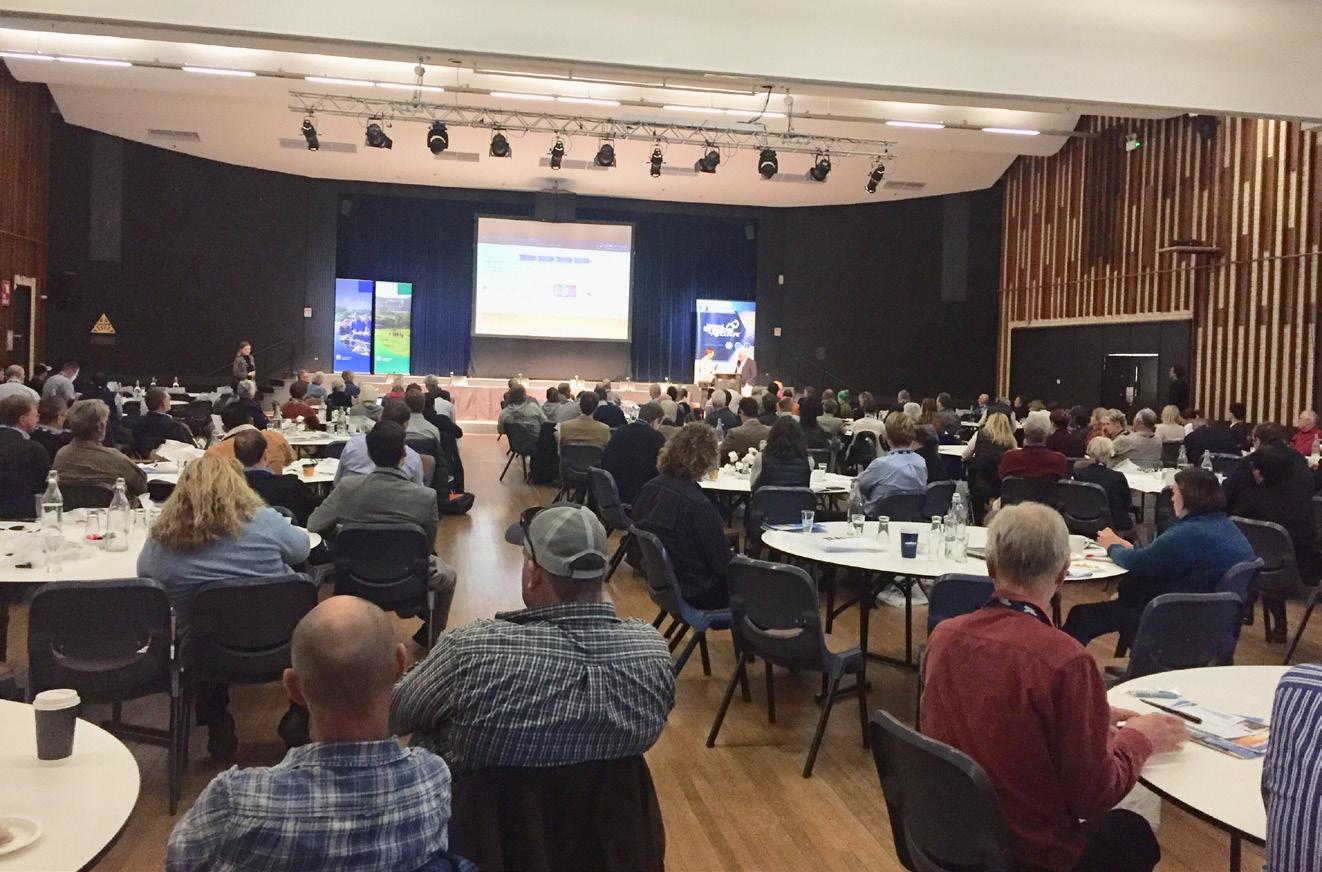
The Conference day itself brings together groups who’s interactions are sometimes characterised by conflict, such as environmentalists, farmers and Governments, to find common ground and seek steps forward together.

Sydney Metro is revolutionising how Australia’s biggest city travels, connecting Sydney’s north west, west, south west and greater west to fast, reliable turn-up-and-go metro services with fully accessible stations.
In anticipation of the pipeline of investment in future transport projects, and the opportunity to drive long-term environmental and social improvements, Sydney Metro has worked with the Green Building Council of Australia (GBCA) to create a Green Star – Custom (Sydney Metro) rating tool which can be applied to railway stations.
The aim was to embed sustainability principles across our projects, supporting transparency, accountability, industry best practice, knowledge sharing and rating tool uptake across the public transport and infrastructure sector.

All seven new Sydney Metro City & Southwest underground stations have achieved a 6 Star “World Leadership” Green Star – Custom (Sydney Metro) Design Review rating in recognition of their sustainability performance.
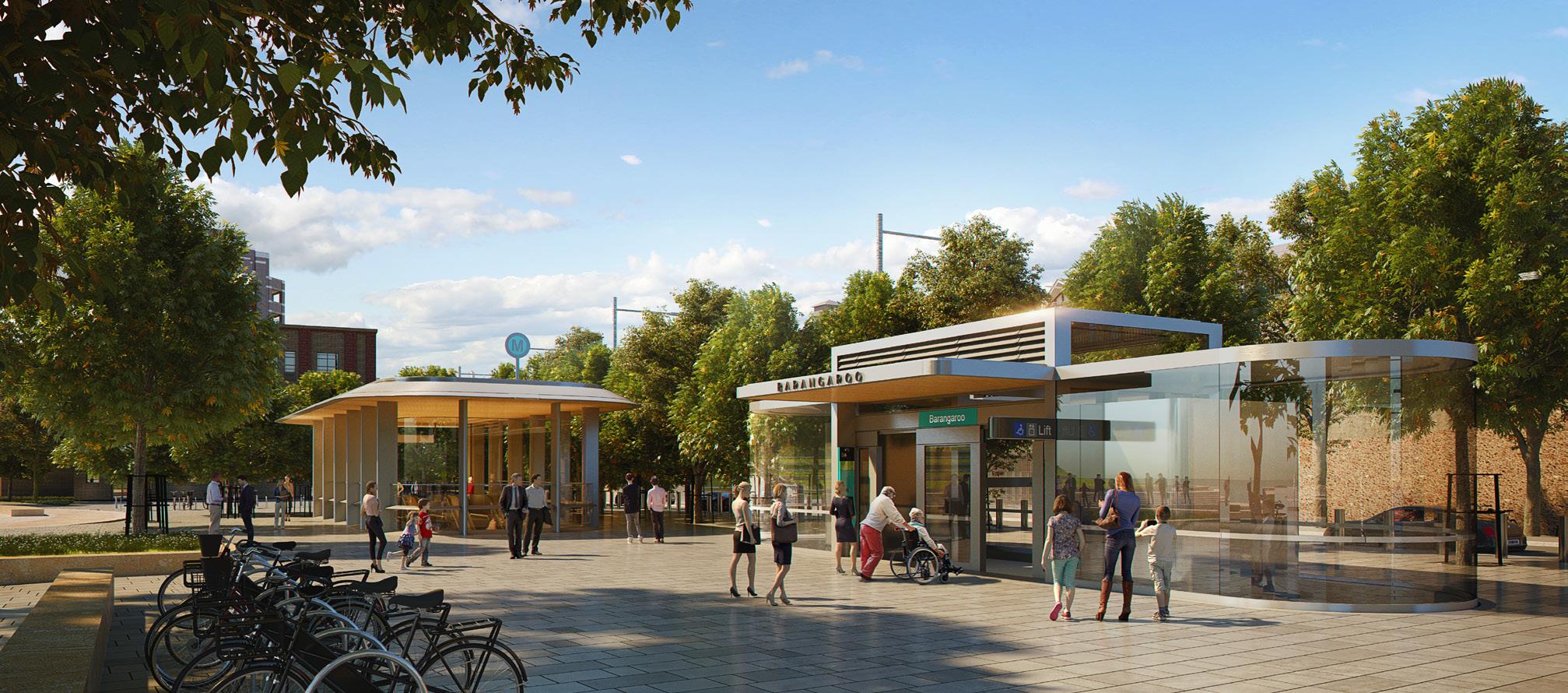
The Green Star rating tool complements the Sydney Metro City & Southwest Sustainability Strategy and associated contractual targets, and aligns with United Nations Sustainable Development Goals (UN SDGs).
There has been a strong focus on innovation (UN SDG 9) to maximise and recognise performance through the Green Star process. Innovation points have been awarded for initiatives pertaining to climate resilience, sustainable site offices, procurement practices, workforce and community benefit.
With a focus on Sydney Metro customers, the stations have incorporated best practice wayfinding, access to active transport, and secure cycle parking (UN SDG 11). Public art and creative landscaping enhance public spaces throughout the station. Customer areas are designed for thermal and acoustic comfort, and incorporate clear communication systems, high fresh air rates and quality lighting.
Responsible consumption and production are a strong driver throughout construction and operation (UN SDG 12). Strict responsible sourcing requirements are in place for construction materials, life cycle assessments have informed project designs and embodied carbon has been minimised by substituting 48% of cement in concrete with fly ash or slag. High construction and demolition waste recycling rates (97%) have been achieved, with 68,740 tonnes diverted from landfill to date. All suitable spoil removed from each site has been beneficially reused.

Design models (using approved Green Star methodologies), predict that the stations will achieve an average of 35% reduction in operational potable water use, and 31% reduction in operational energy use. Barangaroo Station is predicted to achieve a 90% reduction in operational water use by harnessing seawater cooling.
Climate change risk assessments have been carried out for all stations (UN SDG 13) and resilience measures such as increased drainage and cooling capacity built into the design. All of the electricity used during operations will be offset.
This initiative has created and strengthened partnerships towards meeting sustainability goals (UN SDG 17). The sustainability lessons learned and initiatives have been integrated into new Sydney Metro projects, further raising the bar in sustainability performance.
Given the 120-year design life of the stations, this initiative has a significant long-term legacy towards delivering sustainable and city-shaping public transport infrastructure.
The built environment sector, including the cities and towns we live and work in, is responsible for one-quarter of Australia’s greenhouse emissions. Globally, the steel, cement and aluminium industries each produce about 7-9% of annual global greenhouse emissions. These materials are used extensively in the construction of our homes, our places of work and leisure), the roads we drive on, and the public transport we catch.

Embodied carbon is defined as the total greenhouse emissions generated during the manufacture of the materials and products used in the construction and refurbishment of buildings and infrastructure, and in its deconstruction and disposal.
The Materials Embodied Carbon Leaders’ Alliance (MECLA) is an alliance of over 140 different university, government and private organisations collaborating to drive in the decarbonisation of the construction industry (in line with the targets of the Paris Agreement).
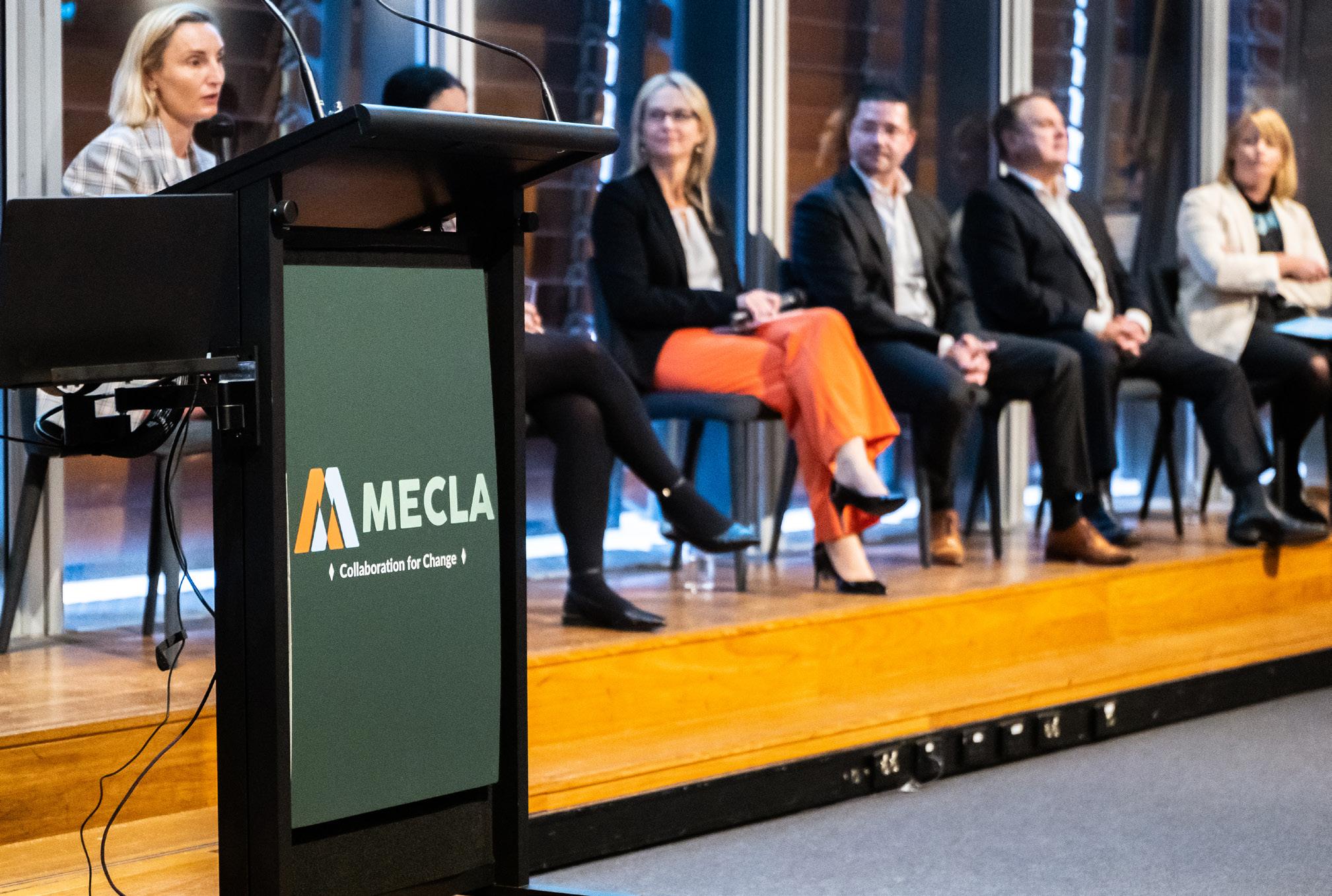
By bringing together participants from across the entire building and construction supply chain, and a deep partnership with the NSW government, we can collectively define existing barriers to change and find the solutions that will be vital to decarbonising the industry/achieving our goals. This is what makes MECLA so unique. It is an alliance of all levels of industry and government, collaborating in a pre-competitive environment to help accelerate the market toward Net Zero and beyond.
MECLA consists of eight working groups, each focussing on particular aspects of and key levers of change for the construction industry’s decarbonisation pathway.

Working Group 1 focuses on sending a clear demand signal for low embodied carbon materials, to boost suppliers’ confidence to invest in decarbonisation innovation. A second Working Group documents and analyses current approaches to embodied carbon benchmarking. Working Group 3/4 focuses on knowledge sharing, as well as developing a common language. Furthermore, there are five materialsfocussed working groups, dedicated to accelerating the supply side of low carbon solutions for materials, such as steel, cement, concrete, aluminium, and others. Recently, a working group on Building Services has been launched as well.
Participants in these working groups are industry and government professionals from along the entire supply chain, all providing crucial inkind support in progressing MECLA’s/ their working group’s agenda. This includes consultation and engagement with government bodies on policy and roadmap developments, as well as evaluating (technical / funding / standards / capacity) barriers facing industry sectors and possible mechanisms and timeframes for Australianbased companies to overcome these. Additionally, the working groups also provide a large range of knowledge products, including case studies, Spotlight events for industry professionals, as well as specifying documents, including a Dictionary of Carbon.
The construction industry is complex, there are myriad moving parts. MECLA has already proven itself to be a successful means to achieve the change we need, at the speed required.

Systems thinking and collaboration guide MECLA, an approach to changemaking that brings together all players in a precompetitive space to develop solutions to the challenges of decarbonisation.
MECLA is a unique model of collaboration, driving the market toward solutions at a speed that individual organisations could not achieve. As a result, it has garnered international interest in similar frameworks for change.
The COVID-19 pandemic, and subsequent toilet paper shortage had an immediate impact on Hunter Water’s wastewater system with a sharp increase observed of nondegradable matter in the wastewater network.

With immediate action required to reduce the risk of blockages in the network, and potential environmental and health risks to the community, Hunter Water delivered a creative message to the community. The message was timely, cost effective, and quirky in order to gain cutthrough in a challenging customer communications and engagement environment.

The ‘Respect the Throne’ campaign successfully cut-through in a cluttered public communications environment and showed that a creative and adaptable communications approach can provide a fast, cost-effective and durable behaviour change outcome.

Being adaptable, responsive and creative was key to achieving fast and measurable behaviour change across the community, to address an escalating operational challenge. The ‘Respect the Throne’ message was delivered using the right tone, at the right time, and in the right place.
Within the Australian water industry, the occurrence of large-scale sewer blockages is significant. Like all sewerage systems, Hunter Water’s network is designed to treat degradable sewerage, known in the industry as the 3P’s. The flushing of items such as paper towels, sanitary products and wipes is further contributing to the problem, resulting in potentially severe impacts to the environment. Other consequences include the impact to community liveability, as well as safety risks to water utility staff, and potential customer dissatisfaction.

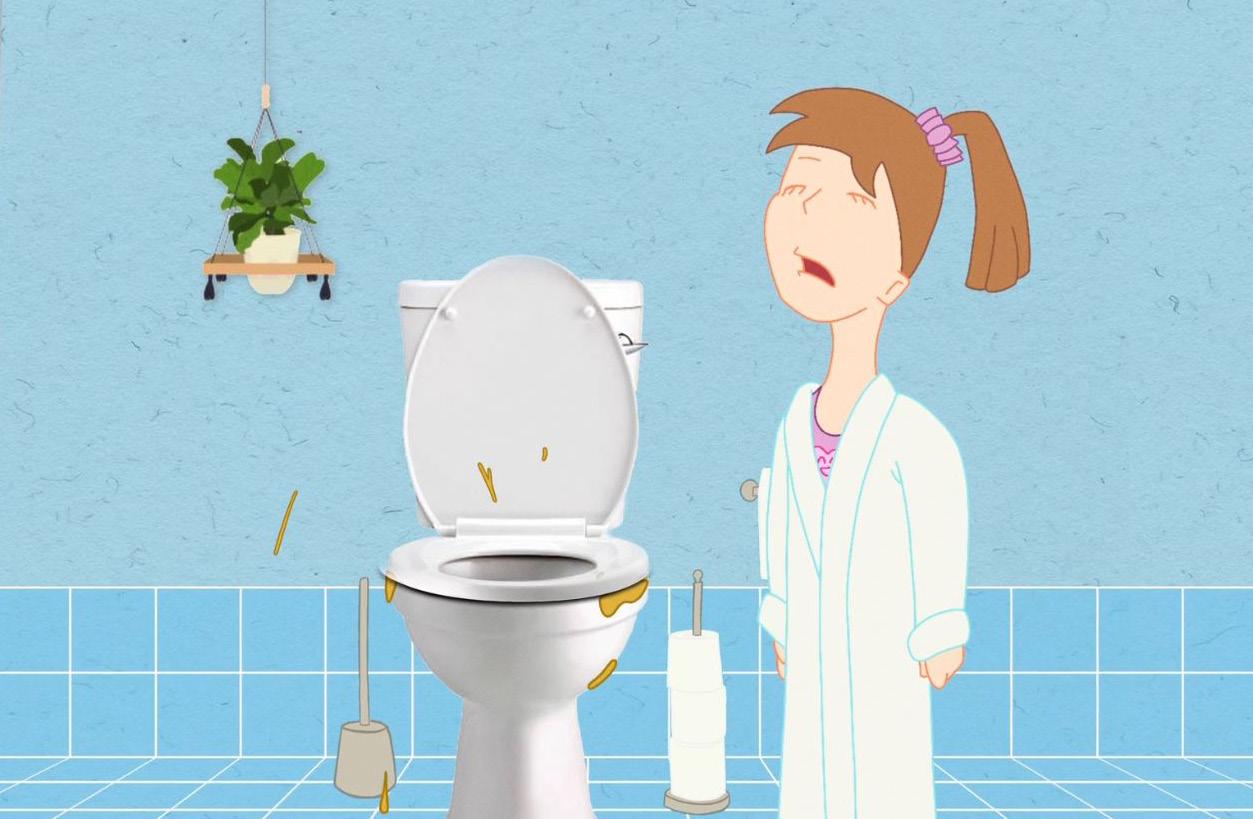
Being aware of the current environment, being relevant whilst delivering a timely message with the right pitch and tone, was what made this a successful engagement approach. This is a topic that doesn’t often get the same attention as water conservation initiatives.
This campaign effectively progressed SDG 6, specifically target 6.1 by improving the efficiency of our waste water plants, target 6.b by providing education around appropriate disposal of non-biodegradable products. The campaign also met the target 6.3 through the reduction of pollution and education resulting in less sewer main breaks and their associated pollution.
Action for Agriculture is empowering young people to solve tomorrows problems today.

How do we inspire young people to be agents of change, creating a movement to embed sustainability thinking and actions in our way of life?

By investigating and reflecting on global sustainability goals and acting at a local level, while connecting them with a giant fibreglass koala, of course!
The student led Kreative KoalasDesign a Bright Future Challenge, supports young people to determine how to think. The program is helping young people learn the problem-solving skills they need to make informed choices and preparing them for the 21st century workforce. Their future is faced with increasingly complex environmental and social issues.
Since its inception in 2017, Kreative Koalas has reached 50,000 students in 180 schools.
This unique K to 6 action learning program, engages primary school students in sustainability awareness, understanding and action through art, design thinking, creativity, teamwork and project development.
Aligned to the Australian curriculum key learning areas, general capabilities, all three cross curriculum priorities and the United Nations Sustainable Development Goals (SDGs), Kreative Koalas supports teachers and students to take local action through fun, interactive projects on the important social and environmental justice issues facing the planet.
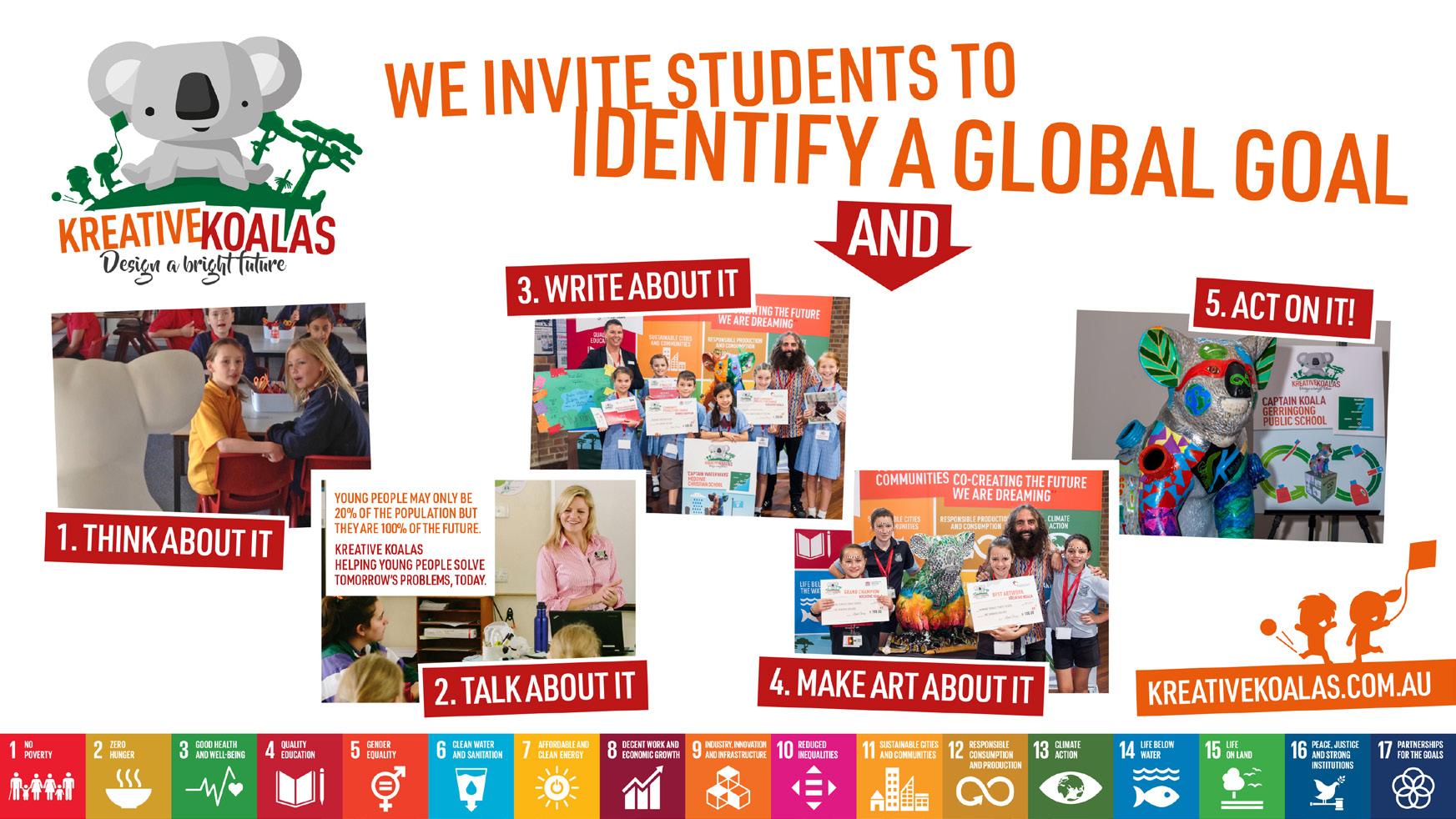

Supported by a diverse range of local sustainability experts from Indigenous elders to government agencies, teachers, students, and their communities are inspired to become changemakers. Starting early and in local communities, enables young people to develop awareness, confidence, and life-long skills to build resilience and act on issues that are important to them and their communities. Through a fully supported co-design journey, the program provides an opportunity for young people to translate complex challenges into concrete problems they feel empowered to solve.
The Koala artwork the students design and create becomes a legacy, reminding the community about the importance of looking after our planet and each other.
The students Community Action Projects are demonstrating the breadth and depth of young leaders’ environmental action: from community gardens to regenerative agriculture, tackling plastic waste, switching to solar energy, spreading awareness amongst their peers, leading the transition to a clean energy economy through alliances. Kreative Koalas is encouraging the resilience in their communities to increasing extreme weather events such as more frequent flooding, bushfires and drought. Partnerships are key to the success of Kreative Koalas and together we see students and teachers become sustainability mavens, creating sustainability frameworks for their schools and collecting data. The data will be analysed by our partnership with UNSW Digital Knowledge Hub, and fed back to the schools to allow them to make best practice sustainability decisions.
After all, young people may be only 20% of our population, but they are 100% of our future.
To bring about change and create sustainable solutions for our world, Kreative Koalas believes we must start with our best and brightest young minds.
Return and Earn is a litter reduction scheme turned product stewardship and contributor to a circular economy.
Return and Earn is an inspiring example of effective, extended producer responsibility in action. Launched in December 2017, the scheme offers many lessons for how other industries can develop their own product stewardship schemes to deal with problem waste.
Community education and marketing activities are based on latest consumer research and best practice behaviour change principles. These could readily be adapted and applied to other product stewardship schemes, including new container deposit schemes being launched in other states in Australia and overseas.
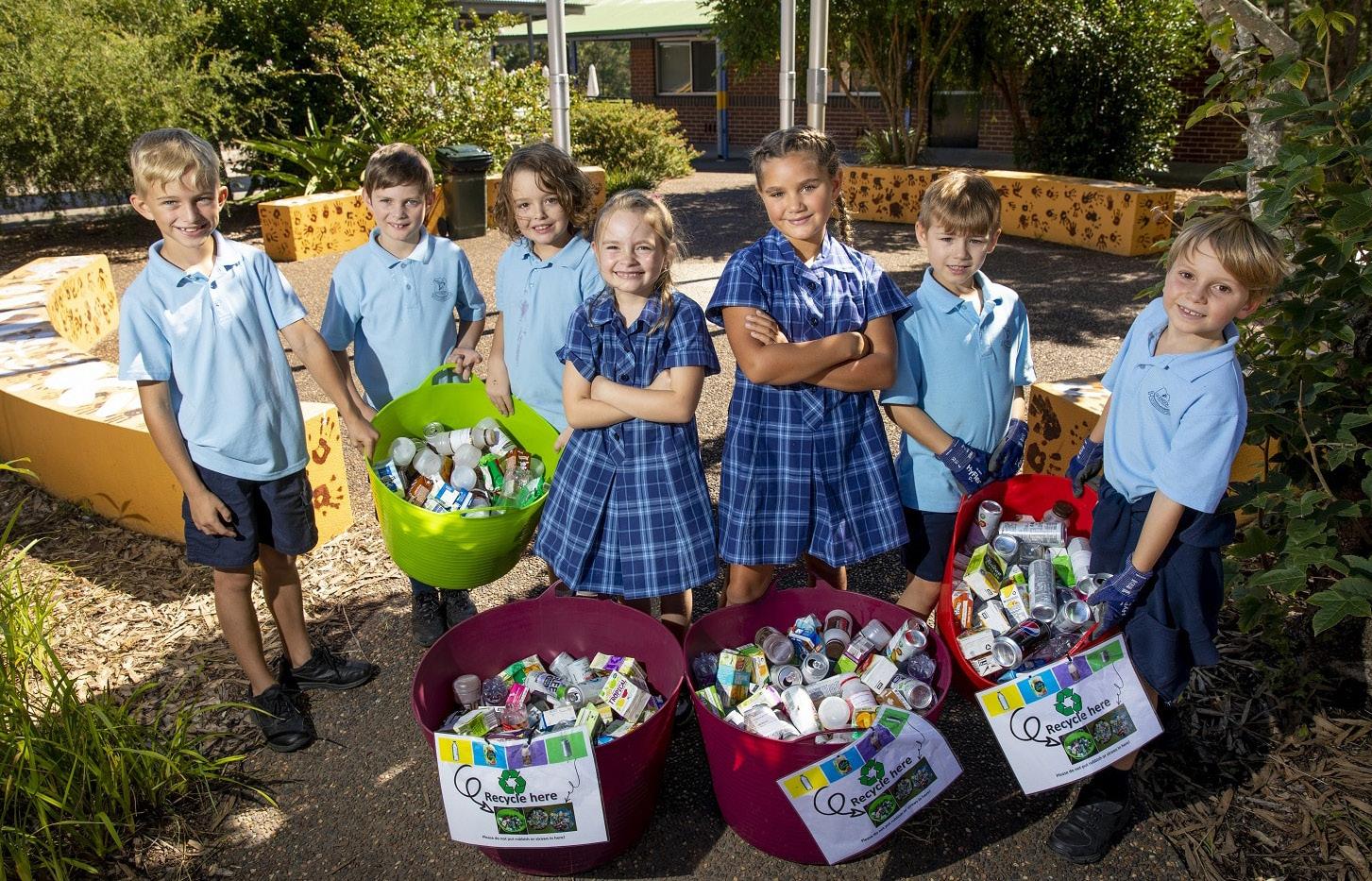

Return and Earn is contributing to a growing domestic circular economy, with high-quality clean stream material being collected through the scheme. Domestic recycling facilities are being expanded as a direct response to the pure materials generated from Return and Earn. Return and Earn operates on a costrecovery basis and is funded by the beverage industry. It provides an effective example of how industry, government and community can work together to achieve positive and measurable environmental, social and economic outcomes.
The customer-centric design to education and marketing activities has shifted perceptions and behaviours around waste and recycling.
Despite launching less than five years ago, Return and Earn is wellloved. Awareness and support are high at 91% and 89% of NSW adults respectively. Return and Earn has become a routine part of life in NSW – 79% of NSW adults have participated, and two-thirds do so once a month or more.
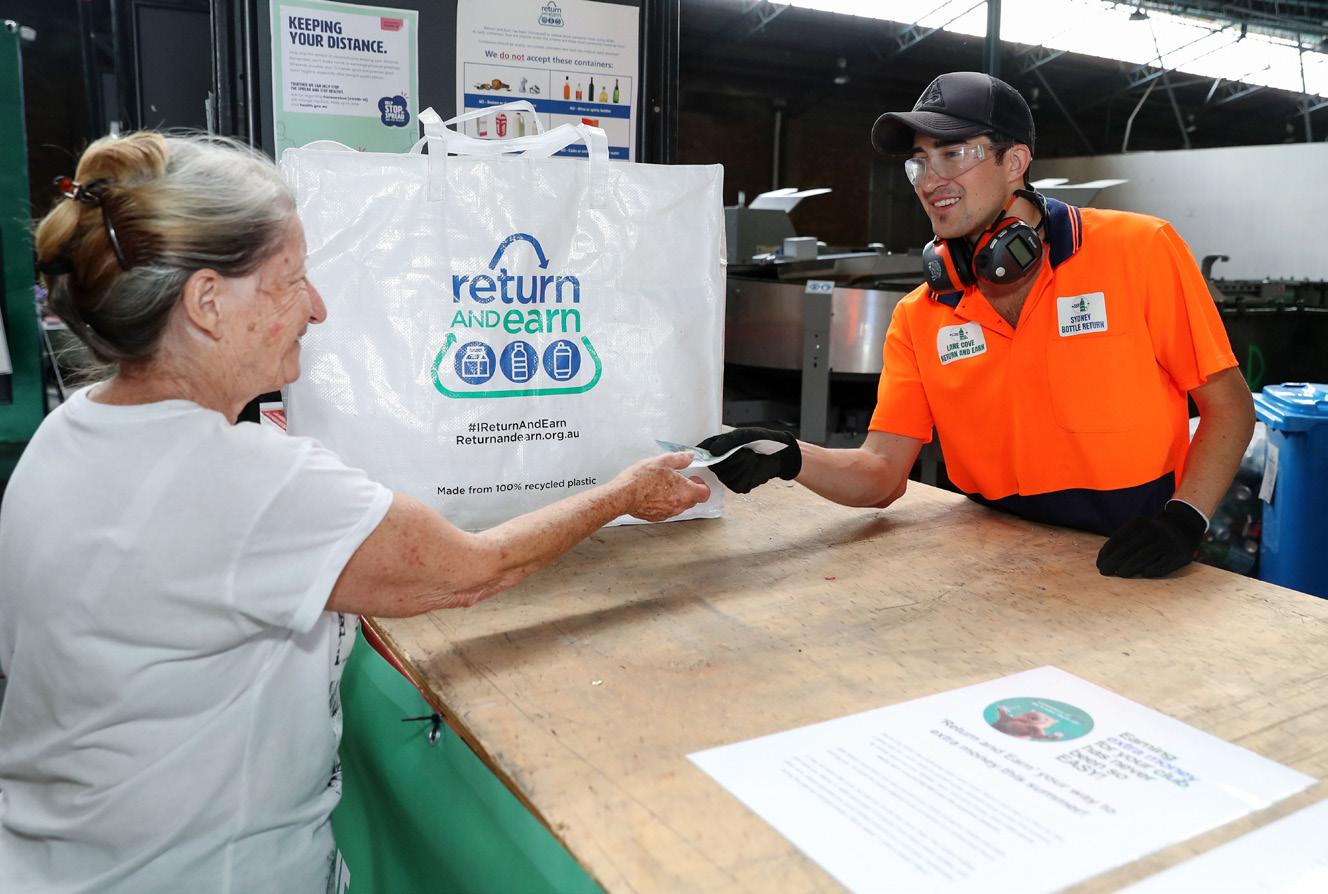
The scheme is also an example of how small changes to our routines can collectively have a big and positive impact to our environment – delivering a 52% reduction in the volume of drink container litter, since it launched in December 2017.

The scheme has seen benefits well beyond the litter reduction goals, with savings in water, energy, landfill and reduction in carbon emissions quantifiable from the containers returned. The 10 cent refund has realised financial benefits across the community, and the opportunity to donate through the scheme is highly utilised by hundreds of charities and community groups, supporting causes reaching all corners of the community.
The vision for the scheme is to drive a sustainable world with resources valued and kept in the loop. The social, economic and environmental benefits of the scheme contribute to eight of the SDG, including addressing issues around: poverty, education, clean water and sanitisation, work and economic growth, inequality, sustainable cities and communities, responsible consumption and production, and life below water.
Over
$790 7.9 million billion drink container
This equates to more than have been returned for recycling by the NSW community. in container refunds returned to the people of NSW.
Return and Earn has proven itself effective in engaging the community to reduce litter and increase recycling. With high awareness and participation among NSW residents and a convenient network of return points across the state, Return and Earn is well placed should the NSW Government consider any future expansion to the scope of material redeemable through the scheme.
Connecting people and nature through science and art to secure a future for Squirrel Gliders.
Petaurus Connections is an innovative approach to threatened species conservation, supported by the Foundation of National Parks & Wildlife and the NSW Government Saving our Species Program. Under the K2W
Glideways banner, the future of the Squirrel Glider (Petaurus norfolcensis), future can be secured, whose numbers are sadly declining due to habitat loss and fragmentation.
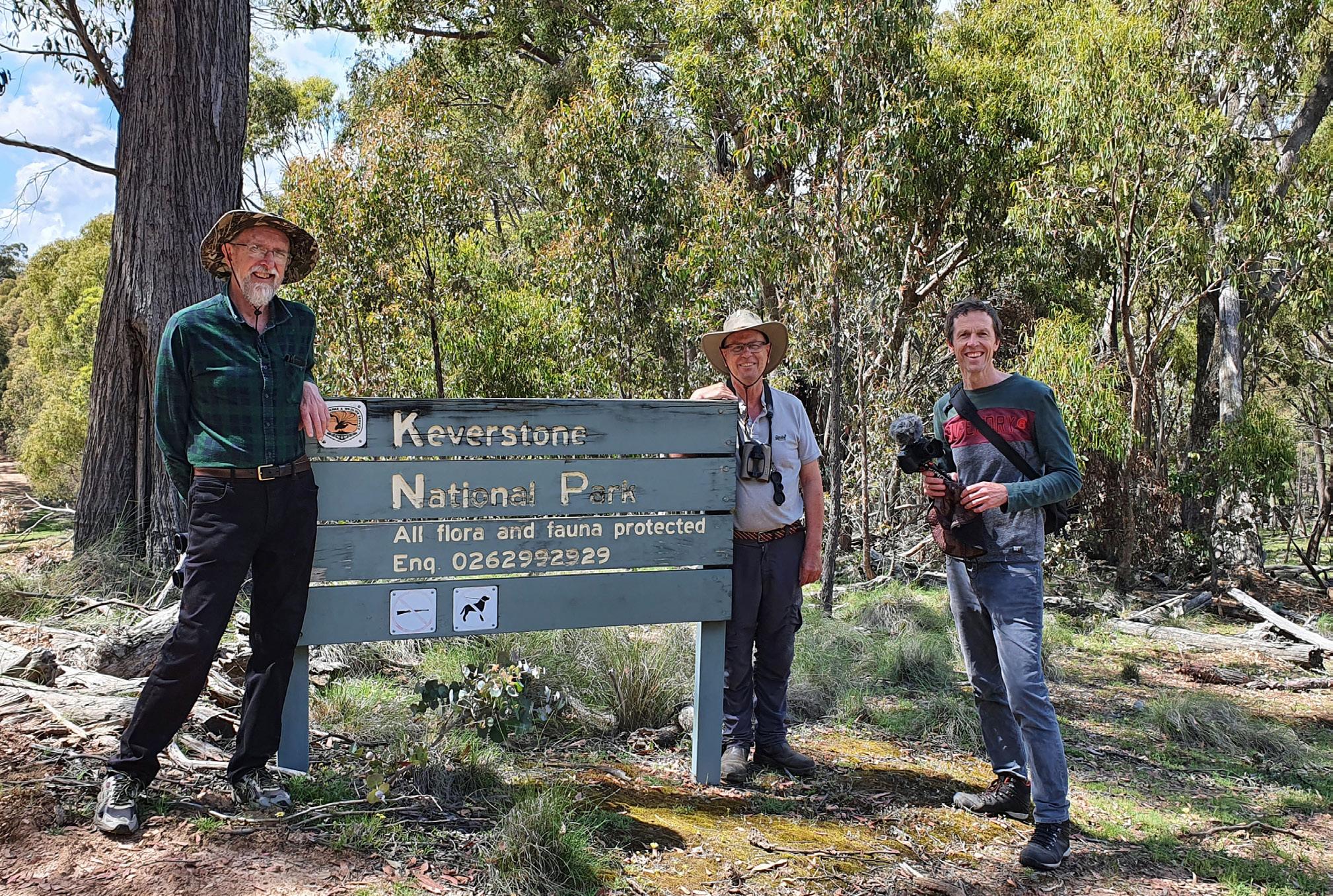

The project brings together ecologists, actors, artists, and digital storytellers to develop multimethod communications targeted to reach local community members, students and farmers, in ways that are meaningful to them. The project inspires action and changing behaviours to protect, connect and restore the"glideways" of the Kanangra-Boyd to Wyangala link

By combining the arts and science Petaurus Connections is inspiring trans disciplinary learning by inviting artists, students, and farmers to pay attention to the world around them and create a deeper connection to the natural world.
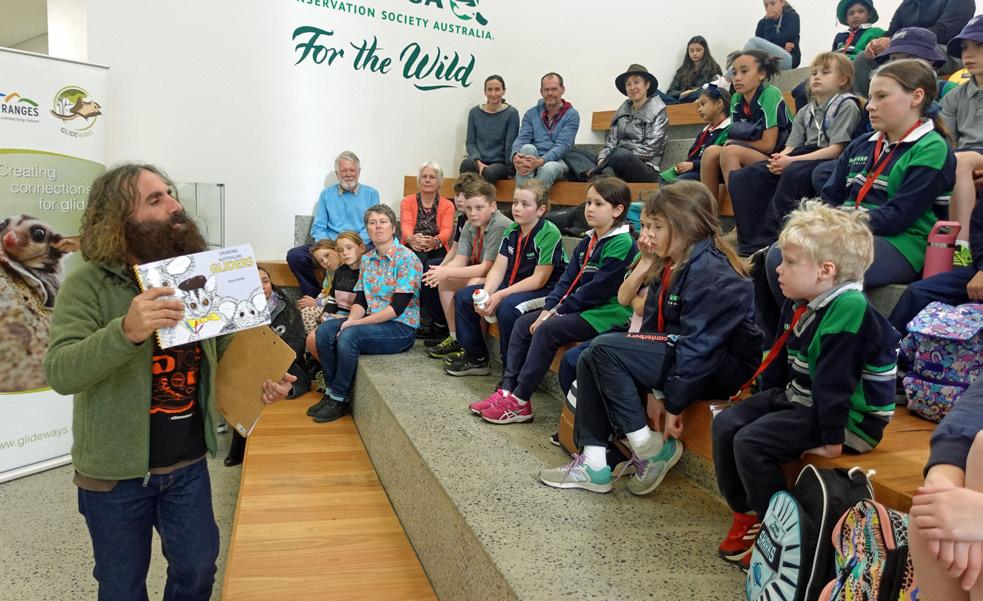
Corridor in Wiradjuri Country. Our featured programs include an interactive play called It's Cat's Play - A catastrophic story, developed in partnership with Eaton Gorge Theatre Company, and an educational art book called Drawing Australian Gliders, written and illustrated by Kate Smith Art and P & J Smith Ecologists.
The story It's Cats Play, tackles the difficult topic of the impact that pet owners are having on our threatened species, and how responsible pet ownership can make a huge difference to our native wildlife, and to the health of wellbeing of pets. The play can be performed live to schools, community groups, or online and has accompanying learning resources linked to the NSW curriculum.

EY Australia is proud to once again be a sponsor of the Banksia Foundation’s NSW Sustainability Awards in 2022.
The awards celebrate the outstanding achievements in sustainability displayed by businesses throughout New South Wales – profiling innovation and aspiration for the future we want to see.
EY exists to build a better working world. We have an ambition to help businesses reframe how business approaches sustainability and putting it at the centre of how value is created.

EY teams work with some of the largest companies around the world, as well as government bodies, not-for-profits, multinational corporations and impact investors to help address their sustainability challenges and achieve individual and collective goals.
EY and the Banksia Foundation have a long history of working together, and we were again delighted to host this year’s awards ceremony, and sponsor the Large Business Sustainable Leadership Award.
Congratulations to the Port Authority of New South Wales on winning the 2022 NSW Sustainability Awards: Large Business Award, as well as all the finalists. We applaud its efforts in building a better working world, and we look forward to hearing about its future progress as it continues to make further strides towards sustainability. The port authroity of NSW deomonstrate how a large infrastructure business can successfully embrace sustainability. We encourage you to read their inspiring story, along with the stories of all the winners of this year’s awards.
Terence Jeyaretnam
EY Asia-Pacific Leader & Partner, Climate Change and Sustainability Services at EY Australia
Nicky Landsbergen
Partner, Climate Change and Sustainability Services at EY Australia
Alexandra Banks
Partner, Climate Change and Sustainability Services at EY Australia
“The views expressed in this article are the views of the author, not Ernst & Young. This article provides general information, does not constitute advice and should not be relied on as such. Professional advice should be sought prior to any action being taken in reliance on any of the information. Liability limited by a scheme approved under Professional Standards Legislation.”
The Banksia Judging and Awards Governance Committee is heavily underpinned by the dedicated individuals that give up their time and expertise in order to review each entry. These individuals have been selected for their expertise and their commitment to Banksia’s mission of identifying and celebrating Australian leadership.
The Banksia Foundation would like to thank our judges - over 50 of thembased right around Australia. These judges are independent to the Banksia Board and Staff. It is of the utmost importance for the Foundation to maintain the independence of the judging process and this is fundamental to the integrity of the Banksia Awards. The judges are all specialists in their field and the judging panels are constructed so that each judge is assigned to a category, which matches their expertise. All potential conflicts of interest are declared from the outset and these judges do not take part in that particular entries assessment.
Banksia would like to acknowledge our Head of the Audit and Risk Committee, Jo Cain. Her commitment and support along with the other Audit and Risk Committee members is invaluable and ensures that we maintain a viable, efficient and reputable judging process.
On behalf of the Banksia Foundation we would like to thank the following individuals who have provided their time and expertise in judging the 2022 NSW Sustainability Awards:
Belinda Cheelingworth
Sue King
Garth Lamb
Jeff Oatman
Will Rayward Smith
Tom Davies
Angela Crossland
Izabella Kobylanski
Jack O’Donoghue
David Rowlinson
Laura Hamilton -O'harra
Liane Rossler
Katherine Featherstone
Andrea Spencer-Cooke
Robin Mellon
Mark Caddey
Kate Harris
Chris Bourne
Erandi Samarakoon
Marnie Kikken
Lucinda Corrigan
Monica Richter
Ed Cotter
Turlough Guerin
Emma Treadgold
Peter Salhani
THIS BOOK IS DESIGNED BY
Vania Japri is a graphic designer that creates visual concepts to final outcome. She specializes in: Branding, Photography, 2D motion design, Website / User Interface, Illustration, Packaging and Editorial layout.
For all enquiries please contact:
Graz van Egmond
CEO, Banksia Foundation
T: +61 419 101 248
E: graz@banksiafdn.com
www.banksiafdn.com